大学英语等级考试四级综合特训
英语专业四级听力特训

英语专业四级听力特训
1. 坚持每天听英语,培养耳朵对英语的敏感度。
可以选择听新闻、英语广播、电视节目等。
2. 使用英语学习App或网站,选择适合自己水平的听力材料
进行训练。
可以选择听力练习题目,如听力填空、听力选择题等。
3. 针对听力中常见的难点和问题,进行有针对性的训练。
比如,练习听懂口音较重的英语,训练听懂连读、省略等语音变化。
4. 多听多模仿,模仿英语中的语音节奏、重音、语调等。
可以选择跟读听力材料,提高听力与口语的配合能力。
5. 做听力笔记,将听到的关键信息记录下来。
可以记录听到的主要内容、关键词、数字等,有助于听力理解和记忆。
6. 利用各种听力资源,如听力练习书籍、听力教程、英语电影、英语原版书等。
多练习不同领域的英语听力,提高听力的广度和深度。
7. 扩大听力的范围,听不同题材和主题的材料。
可以选择科技、经济、文化、历史等各个领域的听力材料,丰富自己的听力背景知识。
8. 培养听力的逻辑思维能力,注意捕捉信息之间的关系和逻辑。
可以通过练习听力材料的总结归纳,训练理解和分析能力。
9. 多和母语为英语的人交流,提高听懂不同口音和语速的能力。
可以参加英语角、找外教进行交流,增加与母语为英语的人的互动机会。
10. 坚持不懈,耐心训练自己的听力。
听力是一个长期积累和
提高的过程,需要持之以恒地进行训练和反复练习。
2024年大学英语四级考前辅导
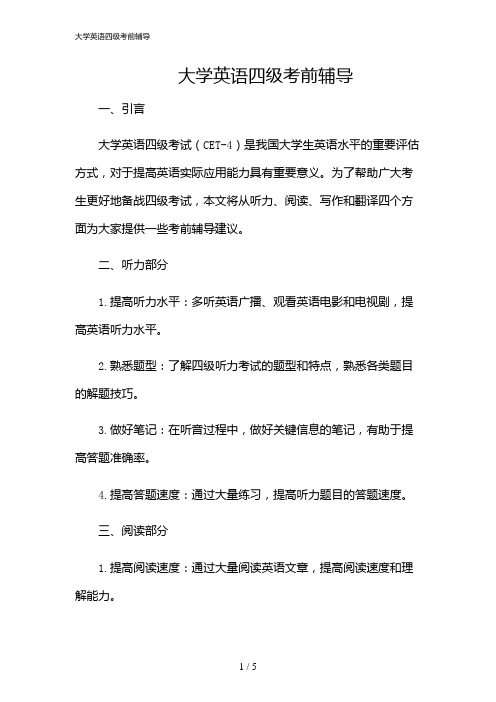
大学英语四级考前辅导一、引言大学英语四级考试(CET-4)是我国大学生英语水平的重要评估方式,对于提高英语实际应用能力具有重要意义。
为了帮助广大考生更好地备战四级考试,本文将从听力、阅读、写作和翻译四个方面为大家提供一些考前辅导建议。
二、听力部分1.提高听力水平:多听英语广播、观看英语电影和电视剧,提高英语听力水平。
2.熟悉题型:了解四级听力考试的题型和特点,熟悉各类题目的解题技巧。
3.做好笔记:在听音过程中,做好关键信息的笔记,有助于提高答题准确率。
4.提高答题速度:通过大量练习,提高听力题目的答题速度。
三、阅读部分1.提高阅读速度:通过大量阅读英语文章,提高阅读速度和理解能力。
的解题技巧。
3.抓住文章主旨:通过阅读文章的首尾段和每段的首尾句,抓住文章的主旨大意。
4.精读与略读相结合:在阅读过程中,根据文章内容和题目要求,合理分配精读和略读的时间和精力。
四、写作部分1.熟悉题型:了解四级写作考试的题型和特点,熟悉各类题目的写作技巧。
2.扩充词汇量:通过大量阅读和背诵,扩充英语词汇量,提高写作水平。
3.提高语法水平:掌握英语基本语法规则,避免在写作过程中出现低级错误。
4.做好时间规划:在考试过程中,合理分配写作时间,确保作文结构完整、内容丰富。
五、翻译部分1.提高汉语水平:翻译能力与汉语水平密切相关,提高汉语水平有助于提高翻译能力。
技巧。
3.掌握翻译方法:了解直译、意译等翻译方法,根据实际情况灵活运用。
4.做好时间规划:在考试过程中,合理分配翻译时间,确保翻译质量。
六、总结一、听力材料的选择为了提高听力水平,考生应该选择多样化的听力材料进行练习。
这些材料可以包括:1.英语新闻:新闻英语是提高英语听力的有效途径,因为它涵盖了广泛的话题和领域,同时新闻播报的语速和发音都相对标准。
2.英语广播节目:例如BBCLearningEnglish、VOALearningEnglish等,这些节目通常会有专门的教学内容,适合不同水平的英语学习者。
大学英语四级强化训练
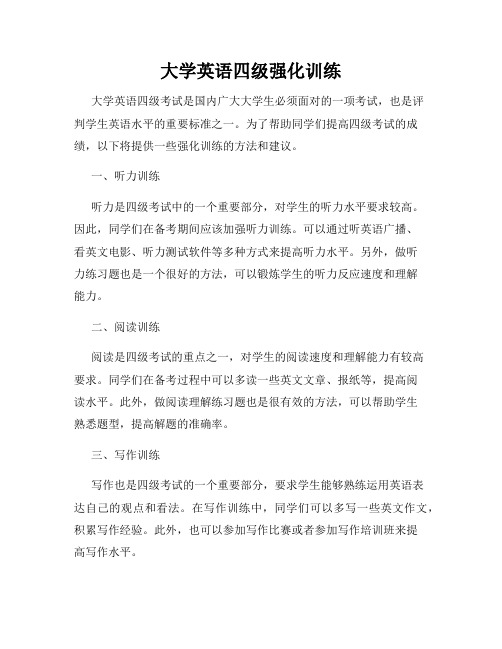
大学英语四级强化训练大学英语四级考试是国内广大大学生必须面对的一项考试,也是评判学生英语水平的重要标准之一。
为了帮助同学们提高四级考试的成绩,以下将提供一些强化训练的方法和建议。
一、听力训练听力是四级考试中的一个重要部分,对学生的听力水平要求较高。
因此,同学们在备考期间应该加强听力训练。
可以通过听英语广播、看英文电影、听力测试软件等多种方式来提高听力水平。
另外,做听力练习题也是一个很好的方法,可以锻炼学生的听力反应速度和理解能力。
二、阅读训练阅读是四级考试的重点之一,对学生的阅读速度和理解能力有较高要求。
同学们在备考过程中可以多读一些英文文章、报纸等,提高阅读水平。
此外,做阅读理解练习题也是很有效的方法,可以帮助学生熟悉题型,提高解题的准确率。
三、写作训练写作也是四级考试的一个重要部分,要求学生能够熟练运用英语表达自己的观点和看法。
在写作训练中,同学们可以多写一些英文作文,积累写作经验。
此外,也可以参加写作比赛或者参加写作培训班来提高写作水平。
四、口语训练口语是四级考试中的一个重要环节,对学生的口语表达能力要求较高。
同学们在备考期间可以多和外教或者语伴练习口语,提高口语表达的流利程度。
另外,可以参加口语角、英文演讲比赛等活动来锻炼口语能力。
综上所述,大学英语四级考试需要同学们在各个方面进行强化训练,包括听力、阅读、写作和口语。
只有通过不断努力和练习,才能提高英语水平,取得好成绩。
希望同学们在备考期间认真对待,取得优异的成绩。
2024年度大学四级统考考前培训(ppt版)

2024/3/23
阅读理解
包括词汇理解、长篇阅读和仔细阅读 等题型,考察考生阅读和理解英文文 章的能力。
翻译
要求考生将一段中文翻译成英文,主 要考察考生的语言转换和表达能力。
5
备考策略与时间规划
提升词汇量
通过背诵单词、阅读英文文章 等方式增加词汇量,提高阅读 速度和准确性。
掌握应试技巧
熟悉考试流程和题型,掌握答 题技巧和时间管理策略。
训练方法
提供阅读模拟题的训练方法,如限时训练、错题重练等。
答题技巧
总结阅读模拟题的答题技巧,包括时间管理、选项分析等。
2024/3/23
14
04
翻译部分精讲与训练
2024/3/23
15
英译中翻译技巧指导
2024/3/23
理解原文意思
01
在翻译前,首先要仔细阅读英文原文,确保完全理解其含义,
包括词汇、语法和上下文。
解析与讨论
对模拟题的答案进行详细解析和讨论,指出考生在翻译过程中存在的问题和不 足,提出改进意见和建议。同时,也可以让考生之间相互学习和交流经验。
2024/3/23
18
05
写作部分精讲与训练
2024/3/23
19
写作题型分析及评分标准
题型分析
四级写作主要考察议论文和应用文两种 类型,其中议论文占比最大。议论文要 求考生就某一话题发表看法,并进行论 证;应用文则要求考生根据特定情境和 目的进行写作,如写信、通知等。
7
听力题型分析及解题技巧
短对话题型
分析对话场景,抓住关键信息,注意转折词和重读词 。
长对话和短文理解
预览选项,预测内容,注意听清文章结构和逻辑关系 。
CET 4 考前综合训练资料
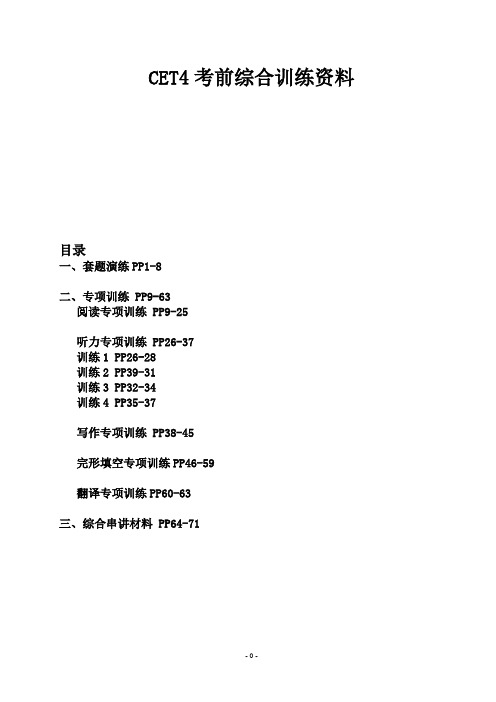
CET4考前综合训练资料目录一、套题演练PP1-8二、专项训练 PP9-63阅读专项训练 PP9-25听力专项训练 PP26-37训练1 PP26-28训练2 PP39-31训练3 PP32-34训练4 PP35-37写作专项训练 PP38-45完形填空专项训练PP46-59翻译专项训练PP60-63三、综合串讲材料 PP64-71一、套题演练大学英语四六级综合训练试题Part I Writing (30 minutes)Directions: For this part, you are allowed 30 minutes to write a short essay on the topic “College Students Learning Budgeting”. You should write at least 120 words following the outl ine given below in Chinese:1. 大学生经常生活费不够用;2. 造成这一现象的原因;3. 学会理财很重要,大学生应该College Students Learning BudgetingPart II Reading Comprehension (Skimming and Scanning) (15 minutes)Directions: In this part, you will have 15 minutes to go over the passage quickly and answer the questions on Answer Sheet 1.For questions 1-7, markY (for YES) if the statement agrees with the information given in the passage;N (for NO) if the statement contradicts the information given in the passage;NG (for NOT GIVEN) if the information is not given in the passage.For questions 8-10, complete the sentences with the information given in the passage.Will We Run Out of Water?Picture a “ghost ship” sinking into the sand, left to rot on dry land by a receding sea. Then imagine dust storms sweeping up toxic pesticides and chemical fertilizers from the dry seabed and spewing them across towns and villages.Seem like a scene from a movie about the end of the world? For people living near the Aral Sea in Central Asia, it‟s all too real. Thirty years ago, government planners diverted the rivers that flow into the sea in order to irrigate(provide water for)farmland. As a result, the sea has shrunk to half its original size, stranding ships on dry land. The seawater has tripled in salt content and become polluted, killing all 24 native species of fish.Similar large-scale efforts to redirect water in other parts of the world have also ended in ecological crisis, according to numerous environmental groups. But many countries continue to build massive dams and irrigation systems, even though such projects can create more problems than they fix. Why? People in many parts of the world are desperate for water, and more people will need more water in the next century.“Growing populations will worsen problems with water,” says Peter H. Gleick, an environmental scientist at the Pacific Institute for studies in Development, Environment, and Security, a research organization in California. He fears that by the year 2025, as many as one third of the world‟s projected 8.3 billion people will suffer from water shortages.Where Water GoesOnly 2.5 percent of all water on Earth is freshwater, water suitable for drinking and growing food, says Sandra Postel, director of the Global Water Policy Project in Amherst, Mass. Two thirds of this freshwater is locked in glaciers and ice caps. In fact, only a tiny percentage of freshwater is part of the water cycle, in which water evaporates and rises into the atmosphere, then condenses and falls back to Earth as precipitation(rain or snow).Some precipitation runs off land to lakes and oceans, and some becomes groundwater, water that seeps into the earth. Much of this renewable freshwater ends up in remote places like the Amazon river basin in Brazil, where few people live. In fact, the world‟s population has access to only 12,500 cubic kilometers of freshwater—about the amount of water in Lake Superior. And people use half of this amount already. “If water demand continues to climb rapidly,”says Postel, “there will be severe shortages and damage to the aquatic environment.”Close to HomeWater woes may seem remote to people living in rich countries like the United States. But Americans could face serious water shortages, too especially in areas that rely on groundwater. Groundwater accumulates in aquifers, layers of sand and gravel that lie between soil and bedrock. (For every liter of surface water, more than 90 liters are hidden underground.)Although the United States has large aquifers, farmers, ranchers, and cities are tapping many of them for water faster than nature can replenish it. In northwest Texas, for example, over pumping has shrunk groundwater supplies by 25 percent, according toPostel.Americans may face even more urgent problems from pollution. Drinking water in the United States is generally safe and meets high standards. Nevertheless, one in five Americans every day unknowingly drinks tap water contaminated with bacteria and chemical wastes, according to the Environmental Protection Agency. In Milwaukee, 400,000 people fell ill in 1993 after drinking tap water tainted with cryptosporidium, a microbe that causes fever, diarrhea and vomiting.The SourceWhere do contaminants come from? In developing countries, people dump raw sewage into the same streams and rivers from which they draw water for drinking and cooking; about 250 million people a year get sick from water borne diseases.In developed countries, manufacturers use 100,000 chemical compounds to make a wide range of products. Toxic chemicals pollute water when released untreated into rivers and lakes. (Certain compounds, such as polychlorinated biphenyls, or PCBs, have been banned in the United States.)But almost everyone contributes to water pollution. People often pour household cleaners, car antifreeze, and paint thinners down the drain; all of these contain hazardous chemicals. Scientists studying water in the San Francisco Bay reported in 1996 that 70 percent of the pollutants could be traced to household waste.Farmers have been criticized for overusing herbicides and pesticides, chemicals that kill weeds and insects but that pollute water as well. Farmers also use nitrates, nitrogen-rich fertilizer that help plants grow but that can wreak havoc on the environment. Nitrates are swept away by surface runoff to lakes and seas. Too many nitrates “over enrich” these bodies of water, encouraging the buildup of algae, or microscopic plants that live on the surface of the water. Algae deprive the water of oxygen that fish need to survive, at times choking off life in an entire body of water.What’s the Solution?Water expert Gleick advocates conservation and local solutions to water-related problems; governments, for instance, would be better off building small-scale dams rather than huge and disruptive projects like the one that ruined the Aral Sea.“More than 1 billion people worldwide don‟t have access to basic clean drinking water,” says Gleick.“There has to be a strong push on the part of everyone—governments and ordinary people—to make sure we have a resource so fundamental to life.”1. That the huge water projects have diverted the rivers causes the Aral Sea to shrink.2. The construction of massive dams and irrigation projects does more good than harm.3. The chief causes of water shortage are population growth and water pollution.4. The problems Americans face concerning water are groundwater shrinkage and tap water pollution.5. According to the passage all water pollutants come from household waste.6. The people living in the United States will not be faced with water shortages.7. Water expert Gleick has come up with the best solution to water-related problems.8. According to Peter H. Gleick, by the year 2025, as many as ________o f the world‟s people will suffer from water shortages.9. Two thirds of the freshwater on Earth is locked in ________.10. In developed countries, before toxic chemicals are released into rivers and lakes, they should be treated ______in order to avoid.Part III Listening Comprehension (35 minutes)Section ADirections: In this section, you will hear 8 short conversations and 2 long conversations. At the end of each conversation, one or more questions will be asked about what was said. Both the conversation and the questions will be spoken only once. After each question there will be a pause. During the pause, you must read the four choices marked [A],[B],[C]and[D], and decide which is the best answer. Then mark the corresponding letter on Answer Sheet 2 with a single line through the centre.11. [A] The man is out of shape.[B] The man doesn‟t need a new racket.[C] The man also needs new tennis shoes.[D] The man spent too much on his tennis shoes.12. [A] She prefers chemistry.[B] She hasn‟t g ot a partner yet.[C] She is too tired of chemistry.[D] She is too busy to work on her chemistry.13.[A] Customer and waitress.[B] Teacher and student.[C] Boss and secretary.[D] Lawyer and client.14. [A] He was satisfied with the service on the ship.[B] It was the first time he had been abroad.[C] He had never been on a warship.[D] He has been on the warship before.15.[A] He is confident.[B] He is worried.[C] He is bored.[D] He is angry.16. [A] The woman offered to help the man find his box.[B] The man doesn‟t know where to go.[C] The woman will buy the man‟s lunch for him.[D] The woman will give the man a treatment.17. [A] It‟s enjoyable.[B] It‟s terrific.[C] It‟s too modern.[D] It‟s old-fashioned.18.[A] Near the stairs.[B] On the platfomp3.[C] At the ticket office.[D] At the infomp3ation desk.Questions 19 to 21 are based on the conversation you have just heard.19. [A] In a college bookstore.[B] In a lecture hall.[C] In a library.[D] In a dormitory.20. [A] English.[B] Biology.[C] Introduction to English Literature.[D] A required course.21. [A] He lives on the 10th floor of Butler Hall.[B] He never wants to listen to students.[C] He used to teach biology.[D] He is an excellent professor.Questions 22 to 25 are based on the conversation you have just heard.22. [A] When to move.[B] Where to live the following year.[C] How much time to spend at home.[D] Whose house to visit.23. [A] Take some money to the housing office.[B] Infomp3 the director of student housing in a letter.[C] Fill out a fomp3 in the library.[D] Maintain a high grade average.24. [A] Both live on campus.[B] Both live off campus.[C] The man lives on campus; the woman lives off campus.[D] The woman lives on campus; the man lives off campus.25. [A] Grades.[B] Privacy.[C] Sports.[D] Money.Section BDirections:In this section, you will hear 3 short passages. At the end of each passage, you will hear some questions. Both the passage and the questions will be spoken only once. After you hear a question, you must choose the best answer from the four choices marked [A], [B], [C]and [D].Then mark the corresponding letter on Answer Sheet 2 with a single line through the centre.Passage OneQuestions 26 to 28 are based on the passage you have just heard.26. [A] The importance of advertisement.[B] The society‟s great need of advertisement.[C] The origin of advertisement.[D] The prosperity of advertisement.27. [A] The local governments.[B] Their owners families.[C] Advertisements.[D] The audience.28. [A] Advertising is personal.[B] Advertisements are convincing.[C] Advertisements are unreliable.[D] Advertisements are misleading.Passage TwoQuestions 29 to 31 are based on the passage you have just heard.29. [A] The games shouldn‟t be held in Salt Lake City.[B] The games have met their environmental goals.[C] The games did little to protect the environment.[D] The games have caused lasting damages to the area.30. [A] Sports competition.[B] Cultural exchange.[C] Economic development.[D] Environmental protection.31. [A] Building ski jumps farther away from the city.[B] Developing better public transportation in the city.[C] Planting more trees around the fields.[D] Promoting the use of cleaner energy.Passage ThreeQuestions 32 to 35 are based on the passage you have just heard.32. [A] Diet.[B] Weight control.[C] Aerobic exercise.[D] Eating habits and exercise.33. [A] Nuts.[B] Sugar.[C] Vegetable oil.[D] Dairy products.34. [A] Forty or fifty minutes of exercise once a week.[B] Twenty or thirty minutes of exercise every day.[C] Fifteen or twenty minutes of exercise five days a week.[D] Thirty or forty minutes of exercise three or four days a week.35. [A] Carbohydrates.[B] Indirect fat.[C] Body fluid.[D] Fat.Section CDirections: In this section, you will hear a passage three times. When the passage is read for the first time, you should listen carefully for its general idea. When the passage is read for the second time, you are required to fill in the blanks numbered from 36 to 43 with the exact words you have just heard. For blanks numbered from 44 to 46 you are required to fill in the missing information. For these blanks, you can either use the exact words you have just heard or write down the main points in you own words. Finally, when the passage is read for the third time, you should check what you have written.Today, students who want to learn English in the US have a wide choice of courses and institutions to (36)________from. And, because the US is such a big country, they also have a huge (37) ________of locations in which to study. The US has a long (38) ________of teaching English because, (39) _________its history, the country has welcomed (40) _________from all over the world, most of whom have needed to learn English. Today, the US‟s English language teaching sector is well developed and its teachers are highly qualified and (41) ________American universities and colleges welcome many thousands of (42) ______students each year, who (43)________on degree or post graduate courses. (44) _______________________________________________________ . These courses are called Intensive English Language Programs and (45)________________________________________________________.In addition to language tuition, Intensive English Language Programs give students (46) __________________________________________________________________________________.Part Ⅳ Reading Comprehension(Reading in Depth)(25 minutes)Section ADirections: In this section, there is a passage with ten blanks. You are required to select one word for each blank from a list of choices given in a word bank following the passage. Read the passage through carefully before making your choices. Each choice in the bank is identified by a letter. Please mark the corresponding letter for each item on Answer Sheet 2 with a single line through the centre. You may not use any of the words in the bank more than once.Questions 47 to 56 are based on the following passage.Shopping habits in the United States have changed greatly in the last quarter of the 20th century. Early in the 1900s most American towns and cities had a Main Street. Main Street was always the 47 of a town. This street was lined on the both sides with many 48 businesses. Here, shoppers walked into stores to look at all sorts of merchandise: clothing, furniture, hardware, groceries. In addition, some shops offered 49 . There shops included drugstores, restaurants, shoe repair stores, and barber or hairdressing shops. But in the 1950s, a change began to 50 place. Too many automobiles had crowded into Main Street while too few parking places were 51 to shoppers. Because the streets were crowded, merchants began to look with interest at the open spaces outside the city limits. Open space is what their car driving customers 52 . And open space is what they got when the first shopping centre was built. Shopping centers, or rather malls, 53 as a collection of small new stores away from crowded city centers. Attracted by hundreds of free parking space, customers were drawn away from 54 areas to outlying malls. And the growing 55 of shopping centers led in turn to the building of bigger and better stocked stores. By the late 1970s, many shopping malls had almost developed into small cities themselves. In addition to providing the 56 of the stop shopping, malls were transformed into landscaped parks, with benches, fountains, and outdoor entertainment.[A]designed [F]convenience [K]cosmetics[B]take [G]services [L]started[C]heart [H]fame [M]downtown[D]needed [I]various [N]available[E]though [J]popularity [O]cheapnessSection BDirections:There are 2 passages in this section. Each passage is followed by some questions or unfinished statements. For each of them there are four choices marked [A], [B], [C]and [D].You should decide on the best choice and mark the corresponding letter on Answer Sheet 2 with a single line through the centre. Passage OneQuestions 57 to 61 are based on the following passage.Culture is one of the most challenging elements of the international marketplace. This system of learned behavior patterns characteristic of the members of a given society is constantly shaped by a set of dynamic variables: language, religion, values and attitudes, manners and customs, aesthetics, technology, education, and social institutions. To cope with this system, an international manager needs both factual and interpretive knowledge of culture. To some extent, the factual knowledge can be learned; its interpretation comes only through experience.The most complicated problems in dealing with the cultural environment stem from the fact that one cannot learn culture—one has to live it. Two schools of thought exist in the business world on how to deal with cultural diversity. One is that business is business the world around, following the model of Pepsi and McDonald‟s. In some cases, globalization is a fact of life; however, cultural differences are still far from converging.The other school proposes that companies must tailor business approaches to individual cultures. Setting up policies and procedures in each country has been compared to an organ transplant; the critical question centers around acceptance or rejection. The major challenge to the international manager is to make sure that rejection is not a result of cultural myopia or even blindness.Fortune examined the international performance of a dozen large companies that earn 20 percent or more of their revenue overseas. The internationally successful companies all share an important quality: patience. They have not rushed into situations but rather built their operations carefully by following the most basic business principles. These principles are to know your adversary, know your audience, and know your customer.57.According to the passage, which of the following is true?[A]All international managers can learn culture.[B]Business diversity is not necessary.[C]Views differ on how to treat culture in business world.[D]Most people do not know foreign culture well.58.According to the author, the model of Pepsi_________.[A]is in line with the theories that the business is business the world around[B]is different from the model of McDonald‟s[C]shows the reverse of globalization[D]has converged cultural differences59.The two schools of thought____________.[A]both propose that companies should tailor business approaches to individual cultures[B]both advocate that different policies be set up in different countries[C]admit the existence of cultural diversity in business world[D]both A and B60.This article is supposed to be most useful for those____________.[A]who are interested in researching the topic of cultural diversity[B]who have connections to more than one type of culture[C]who want to travel abroad[D]who want to run business on International Scale61.According to Fortune, successful international companies________________.[A]earn 20 percent or more of their revenue overseas[B]all have the quality of patience[C]will follow the overseas local cultures[D]adopt the policy of internationalizationPassage TwoQuestions 62 to 66 are based on the following passage.There are people in Italy who can‟t stand soccer. Not all Canadians love hockey. A similar situation exists in America, where there are those individuals you may be one of them who yawn or even frown when somebody mentions baseball. Baseball to them means boring hours watching grown men in funny tight outfits standing around in a field staring away while very little of an ything happens. They tell you it‟s a game better suited to the 19th century, slow, quiet, and gentlemanly. These are the same people you may be one of them who love football because there‟s the sport that glorifies “the hit”.By contrast, baseball seems abstract, cool, silent, still.On TV the game is fractured into a dozen perspectives, replays, close-ups. The geometry of the game, however, is essential to understanding it. You will contemplate the game from one point as a painter does his subject; you may, of course, project yourself into the game. It is in this projection that the game affords so much space and time for involvement. The TV won‟t do it for you.Take, for example, the third baseman. You sit behind the third base dugout and you watch him watching home plate. His legs are apart, knees flexed. His arms hang loose. He does a lot of this. The skeptic still cannot think of any other sports so still, so passive. But watch what happens every time the pitcher throws: the third baseman goes up on his toes, flexes his arms or brings the glove to a point in front of him, takes a step right or left, backward or forward, perhaps he glances across the field to check his first baseman‟s position. Suppose the pitch is a ball. “Nothing happened,” you say. “I could have had my eyes closed.”The skeptic and the innocent must play the game. And this involvement in the stands is no more intellectual than listening to music is. Watch the third baseman. Smooth the dirt in front of you with one foot; smooth the pocket in your glove; watch the eyes of the batter, the speed of the bat, the sound of horsehide on wood. If football is a symphony of movement and theatre, baseball is chamber music, a spacious interlocking of notes, chores and responses.62.The passage is mainly concerned with_____________.[A]the different tastes of people for sports[B]the different characteristics of sports[C]the attraction of football[D]the attraction of baseball63.Those who don‟t like baseball may complain that_______________.[A]it is only to the taste of the old[B]it involves fewer players than football[C]it is not exciting enough[D]it is pretentious and looks funny64.The author admits that____________.[A]baseball is too peaceful for the young[B]baseball may seem boring when watched on TV[C]football is more attracting than baseball[D]baseball is more interesting than football65.By stating “I could have had my eyes closed.” the author means (4th paragraph last sentence)_____________.[A]the third baseman would rather sleep than play the game[B]even if the third baseman closed his eyes a moment ago, it could make no difference to the result[C]the third baseman is so good at baseball that he could finish the game with eyes closed all the timeand do his work well[D]the consequence was so bad that he could not bear to see it66.We can safely conclude that the author__________________.[A]likes football[B]hates football[C]hates baseball[D]likes baseballPart V Cloze (15 minutes)Directions:There are 20 blanks in the following passage. For each blank there are four choices marked [A], [B], [C]and [D]on the right side of the paper. You should choose the ONE that best fits into the passage. Then mark the corresponding letter on Answer Sheet 2 with a single line through the centre.Who won the World Cup 1994 football game? What happened at the United Nations? How did the critics like the new play? 67 an event takes place, newspapers are on the streets 68 the details. Wherever anything happens in the world, reports are on the spot to 69 the news. Newspapers have one basic 70 , to get the news as quickly as possible from its source, from those who make it to those who want to 71 it. Radio, telegraph, television, and 72 inventions brought competition for newspapers. So did the development of magazines and other means of communication. 73 , this competition merely spurred the newspapers on. They quickly made use of the newer and faster means of communication to improve the 74 and thus the efficiency of their own operations. Today more newspapers are 75 and read than ever before. Competition also led newspapers to branch out to many other fields. Besides keeping readers 76 of the latest news, today‟s newspapers 77 and influence readers about politics and other important and serious matters. Newspapers influence readers‟ economic choices 78 advertising. Most newspapers depend on advertising for their very 79 . Newspapers are sold at a price that80even a small fraction of the cost of production. The main 81 of income for most newspapers is commercial advertising. The 82 in selling advertising depends on a newspaper‟s value to advertisers. This 83 in terms of circulation. How many people read the newspaper? Circulation depends 84 on the work of the circulation department and on the services or entertainment 85 in a newspaper‟s pages. But for the most part, circulation depends on a newspaper‟s value to readers as a source of information 86 the community, city, country, state, nation, and world—and even outer space.67.[A]Just when [B]While [C]Soon after [D]Before68.[A]to give [B]giving [C]given [D]being given69.[A]gather [B]spread [C]carry [D]bring70.[A]reason [B]cause [C]problem [D]purpose71.[A]make [B]publish [C]know [D]write72.[A]another [B]other [C]one another [D]the other73.[A]However [B]And [C]Therefore [D]So74.[A]value [B]ratio [C]rate [D]speed75.[A]spread [B]passed [C]printed [D]completed76.[A]inform [B]be informed [C]to informed [D]informed77.[A]entertain [B]encourage [C]educate [D]edit78.[A]on [B]through [C]with [D]of79.[A]forms [B]existence [C]contents [D]purpose80.[A]tries to cover [B]manages to cover [C]fails to cover [D]succeeds in81.[A]source [B]origin [C]course [D]finance82.[A]way [B]means [C]chance [D]success83.[A]measures [B]measured [C]is measured [D]was measured84.[A]somewhat [B]little [C]much [D]something85.[A]offering [B]offered [C]which offered [D]to be offered86.[A]by [B]with [C]at [D]aboutPart Ⅵ Translation (5 minutes)Direction:Complete the sentences on Answer Sheet 2 by translating into English the Chinese given inbrackets.87.There‟s a man at the reception desk who seems very angry and I think he means________________ (想找麻烦).88.Why didn‟t you tell me you could lend me the money? ________________________ (本来不必从银行借钱的).89.__________________________(正是由于她太没有经验) that she does not know how to deal with the situation.90.I__________________________________________ (将在做实验) from three to five this afternoon.91.If this can‟t be settled reasonably, it may be necessary to__________________________________ (诉诸武力).二、专项训练阅读专项训练(1)快速阅读Reading Comprehension (Skimming and Scanning)(15 minutes)Directions: In this part, you will have 15 minutes to go over the passage quickly and answer the questions on Answer Sheet 1. For questions 1-7, mark Y(for YES)if the statement agrees with the information given in the passage; N(for NO)if the statement contradicts the information given in the passage; NG(for NOT GIVEN)if the information is not given in the passage. For questions 8-10, complete the sentences with the information given in the passage.HighwaysEarly in the 20th century, most of the streets and roads in the U.S. were made of dirt, brick, and cedar wood blocks. Built for horse, carriage, and foot traffic, they were usually poorly cared for and too narrow to accommodate (容纳)automobiles.With the increase in auto production, private turnpike (收费公路)companies under local authorities began to spring up, and by 1921 there were 387,000 miles of paved roads. Many were built using specifications of 19th century Scottish engineers Thomas Telford and John Macadam (for whom the macadam surface is named), whose specifications stressed the importance of adequate drainage. Beyond that, there were no national standards for size, weight restrictions, or commercial signs. During World War I, roads throughout the country were nearly destroyed by the weight of trucks. When General Eisenhower returned from Germany in 1919, after serving in the U.S. Army's first transcontinental motor convoy (车队), he noted: "The old convoy had started me thinking about good, two-lane highways, but Germany's Autobahn or motorway had made me see the wisdom of broader ribbons across the land".It would take another war before the federal government would act on a national highway system. During World War II, a tremendous increase in trucks and new roads were required. The war demonstrated how critical highways were to the defense effort: thirteen per cent of defense plants received all their supplies by truck, and almost all other plants shipped more than half of their products by vehicle. The war also revealed that local control of highways had led to a confusing variety of design standards. Even federal and state highways did not follow basic standards. Some states allowed trucks up to 36,000 pounds, while others restricted anything over 7,000 pounds. A government study recommended a national highway system of 33,920 miles, and congress passed the Federal-Aid Highway Act of 1944, which called for strict contract-controlled design criteria.The interstate highway system was finally launched in 1956 and has been hailed as one of the greatest public projects of the century. To build its 44,000 mile web of highways, bridges, and tunnels, hundreds of unique engineering designs and solutions had to be worked out. Consider the many geographic features of the country: mountains, steep grades, wetlands, rivers, deserts and plains. V ariables included the slope of the land, and the ability of the pavement to support the load. Innovative designs of roadways, tunnels, bridges, overpasses, and interchanges that could run through or bypass urban areas soon began to weave their way across the country, forever altering the face of America.Long-span, segmented-concrete, cable-stayed bridges such as Hale Boggs in Louisiana and the Sunshine Skyway in Florida, and remarkable tunnels like Fort MC Henry in Maryland and Mr. Baker in Washington developed under the nation's physical challenges. Traffic control systems and methods of construction developed under the interstate program soon influenced highway construction around the world, and were invaluable in improving the condition of urban streets and traffic patterns.Today, the interstate system links every major city in the U.S. and the U.S. with Canada and Mexico. Built with safety in mind the highways have wide lanes and shoulders, dividing medians, or barriers, long entry and exit lanes, curves engineered for safe turns, and limited access. The death rate on highways is half that of all other U.S. roads (0.86 deaths per 100 million passenger miles compared to 1.99 deaths per 100 million on all other roads).By opening the North American continent, highways have enabled consumer goods and services to reach people in remote and rural areas of the country, spurred the growth of suburbs, and provided people with greater options in terms of jobs, access to cultural programs, health care, and other benefits. Above all, the interstate system provides individuals with what they enrich most: personal freedom of mobility.The interstate system has been an essential element of the nation's economic growth in terms of shipping and job creation: more than 75 percent of the nation's freight deliveries arrive by truck. And most products。
四级词汇特训(含答案)

——序言英语与您已经有了“超友谊的感情”,她正潜移默化的融入您的生活,影响您的思维和举止。
相比之下,四、六级只是一个小插曲。
付博为您所能做的是把握考试的脉搏,帮助您向四、六级的顶峰冲击;帮助您将这“超友谊的感情”发挥到极致。
我们共同协作,每天把英语挂在嘴边,藏在梦里……总有一天,您会突然发现您已经完全主宰了她,拥有了她。
God helps only those who are diligent! (天道酬勤!)少年时,我们都受尽了“泥土英语”、“教条英语”的摧残,企图在“This is a apple. Those are apples……”之类的乏味句子中了解一门语言。
毫无文化背景的文字和教条的教学给我们造成了心理上的隔阂。
步入大学以后,一个突如其来的形式化、指令性的“四级”让我们的大学生活黯然失色。
但是,英语必定是一个必不可少的东西,就像我们生活中的手机短信、酷哥靓女、QQ、“泡泡堂”一样。
我们有必要对英语冷眼相看吗?不妨我们一起坐下来,共同演绎英语四、六级考题里所涉及的异国风情,共同领略相关的人生哲学,共同嗤笑命题的荒谬纰漏……顺便共同积累素材并总结应试思路。
在这里,我们用英语来憧憬另外一个远离功利的世界。
别忘了,兴趣是最好的老师。
Get out teeth into English study!(全情投入英语世界!)在电影Philadelphia(费城故事)里,Tom Hanks有一句台词:Every problem has a solution.(每个问题总有对策)。
如果我们一味回避,总有一天会变成无法生存的边缘人。
Where there is a will, there is a way!(有志者,事竟成!)Section A:Vocabulary and StructureUnit 1alter v.改变associate vt.使发生联系,使联合n.合作人,同事bound adj.开往…去的;被束缚的;一定的build up变得更大,更多conform to符合,遵照convert vt.使转变,使、、、改变信仰n.皈依者involve vt.包括,卷入,使陷于vi.(in) make up 构成,化妆,编造make up for 弥补,补偿stand for 代表tie n.领带vt.系,打结vary vi变化,不同various adj.多样的1.A healthy life is frequently thought to be with the open countryside and homegrown food.A. tiedB. boundC. involvedD. associated2.In Britain today women 44% of the workforce, and nearly half the mothers with children are in paid work.A. build upB. stand forC. make upD. conform to3.Features such as height, weight, and skin color from individual to individual and from face to face.A. changeB. varyC. alterD. convertUnit 2abuse v.滥用,虐待,辱骂n.滥用,虐待,辱骂attempt vt.尝试,企图n.努力,尝试(to do sth) call for 要求call off 结束,取消call on号召,呼吁;访问call up召唤,使想起,打电话给desire n.愿望,欲望vt.想望employ vt.雇用;使用employment就业,雇佣~ee 雇员~er 雇主intention n.意图,目的overlook vt.忽略,俯瞰purpose n.目的,意图on ~故意地1.A well-written composition good choice of words and clear organization among other things.A. calls onB. calls for C calls up D. calls off2.It has been revealed that some government leaders their authority and position to get illegal profits for themselves.A. employB. takeC. abuseD. overlook3.Shelly had prepared carefully for her biology examination so that she could be sure of passing it on her first .A. intentionB. attemptC. purposeD. desireUnit 3considerable adj.1.值得考虑的2.相当大(或多)的,相当可观的considerate adj.体贴的,为别人着想的enormous adj.巨大的,庞大的lay aside 搁置lay down放下,放弃lay off 裁员,解雇lay out 安排,布置numerous adj.众多的,许多的,无数的rack n.架rainbow 彩虹n.ribbon n. 丝带rush n. 勿促,冲进,急流vi.冲,奔,涌现significant adj.有意义的,重大1.The store had to a number of clerks because sales were down.A. lay outB. lay offC. lay asideD. lay down2.Writing is a slow process, requiring thought, time, and effort.A. significantB. considerableC. enormousD. numerous3.Lightning is a of electrical current from a cloud to the ground or from one cloud to another.A. rushB. rainbowC. rackD. ribbonUnit 4arrange v.安排,排列classify vt.分类gap n.缺口,间隙,差距glimpse n.一瞥,一看v.瞥见interval n. (时间)间隔幕间休息at ~s每隔(一段)时间length n.长度occupy vt. 占用,占领,占据rank n. 等级,阶级vt. 把…分等rate n. 比率,费用scene n.现场,景色,[戏剧]布景vision n.视力;视觉;想象力;幻想1.New York second in the production of apples, producing 850,000,000 pounds this year.A. rankedB. occupiedC. arrangedD. classified2.I caught a of the taxi before it disappeared around the corner of the street.A. visionB. glimpseC. lookD. scene3.Students or teachers can participate in excursions to lovely beaches around the island at regular .A. gapsB. rateC. lengthD. intervalsUnit 5alike adj.相同的,相似的adv.以同样的方式equivalent adj 相等的,相当的(to)n.等价物,相等物flat adj.平坦的,扁平的n.公寓harsh adj.粗糙的,苛刻的,刺耳的likely adj. 很可能的adv.或许,很可能take effect v.见效,生效take part (in)v.参加take place v.发生take turns v.轮流(to do sth.) tedious adj.乏味的uniform adj.统一的,相同的n.制服vigorous adj.精力旺盛的1.Physics is to the science which was called natural philosophy in history.A. alikeB. equivalentC. likelyD. uniform2.The new appointment of our president from the very beginning of next semester.A. takes effectB. takes partC. takes placeD. takes turns3.The president made a speech at the opening ceremony of the sports meeting, which encouraged the sportsmen greatly.A. vigorousB. tediousC. flatD. harshUnit 6hang up终止,挂断hang about 闲晃,闲逛hang on 坚持,不挂断raise vt举起(sth.),抚养(sb),筹集spoil vt.搞糟,宠坏,溺爱tear vt.撕坏arouse v.唤醒,激起(情感)arise vi.出现,发生,起因于rise n.上升,增加vi.升起,起义,增长wreck n. 失事船(或飞机),残骸vt.破坏,拆毁injure vt.损害,伤害1.It is not easy to learn English well, but if you , you will succeed in the end.A. hang upB. hang aboutC. hang onD. hang ontost year the advertising rate by 20 percent.A. raisedB. arousedC. aroseD. rose3.The strong storm did a lot of damage to the coastal villages: several fishing boats were and many houses collapsed.A. wreckedB. spoiledC. tornD. injuredUnit 7approachable adj.可接近的available adj.可买到的,有用的,有空的crash n.碰撞,坠落v.碰撞,坠毁mind n.头脑,智力,精神vt.注意,留意介意mood n.心情,情绪passion n. 激情,热情(for)pollute vt.弄脏,污染probable adj.很可能的,大概的ready adj.有准备的,准备完毕的,现成的,迅速的spot n. 点,污点,地点,场所,现场v.沾污,弄脏,侦察vt.认出,发现stain n.污点,瑕疵(不易清除的)v. 染污,沾污temper n.性情,脾气,情绪lose~发脾气1、The manager lost his just because his secretary was ten minutes late.A. moodB. temperC. mindD. passion2.Please be careful when you are drinking coffee in cooking in case you _____ the carpet.A. crashB. polluteC. spotD. stain3.Convenience foods which are already prepared for cooking are in grocery stores.A. readyB. approachableC. probableD. availableUnit 8acceptable adj.可接受的,合意的advisable adj.可取的,明智applicable adj.可适用的,可应用的available adj.可买到的,有用的,有空的capacity n.容量,能力length n.长度,(时间的)长短possibility n.可能性,可能发生的事物resist vt.抵抗,忍得住strength n.力量,力气,实力sustain n.支撑(重量),持续tolerate vt.忍受,容忍undergo vt.经历,遭受1. Some old people don’t like pop songs because they can’t so much noise.A. resistB. sustainC. tolerateD. undergo2. In general, the amount that a student spends for housing should be held to one-fifth of the total ____ for living expenses.A. acceptableB. applicableC. advisableD. available3. Housewives who do not go out to work often feel they are not working to their full .A. strengthB. capacityC. lengthD. possibilityUnit 9adapt vt.使适应,改编adapt oneself to使自己适应adopt vt.采用,收养consider vt.考虑consider doing认为consider to do sthreceive vt. 收到,接收(被动接受)regard n. 关心,尊重,致意~for sb/sth.vt.看待,当作reveal vt.展现,提示,暴露reverse n.相反,背面adj.相反的,颠倒的vt.颠倒revise vt.修订,校订rewrite v.重写,改写be supposed to do th.应该…,一定…1.I have people who the end of a film that yo u haven’t seen before.A. reviseB. rewriteC. revealD. reverse2.He’s watching TV?He’s to be cleaning his room.A. knownB. consideredC. regardedD. supposed3.The old couple decided to a boy and a girl though they had three children of their own.A. adaptB. bringC. adoptD. receiveUnit 10accuse vt.控告,谴责,非难charge n. 费用,掌管v.控诉,收费~sb.with sth.收费extent n. 范围,程度to~到…程度heighten v.提高,升高increase n.增加,增大,增长vt.增加,加大vi.增加,繁殖level n.水准,标准,级别promote vt.促进,促销,提升,提拔punish vt.惩罚,处罚quantity n.量,数量range n.范围,射程scold v.责骂,申斥,斥责1.The government is trying to do something to ____ better understanding between the two countries.A. raiseB. increaseC. heightenD. promote2.The newspaper did not mention the ____ of the damage caused by the fire.A. extentB. increaseC. rangeD. quantity3.The soldier was of running away when the enemy attacked.A. accusedB. chargedC. scoldedD. punishedUnit 11break down v.垮掉,(机器)停止运转break off v.中断,折断,突然停止break out v.突发,爆发break up v.打碎,拆散,分裂,结束by means of 凭借,依靠by way of经由in place of取代in terms of就…而言stand for代表strive for奋斗,争取strike at 打击,敲击stick to v.粘住,坚持1. Because Edgar was convinced of the accuracy of this fact, he his opinion.A. stuck toB. strove forC. struck atD. stood for2. Which sport has the most expenses training equipment, plays’ personal equipment and uniforms?A. in place ofB. in terms ofC. by means ofD. by way of3.The car halfway for no reason.A. broke offB. broke downC. broke upD. broke outUnit 12adapt vt.使适应,改编coordinate vt.调整,协调grasp vt.抓住,掌握,领会n.抓住,抓紧,掌握regulate vt.管制,控制,调节response n.回答,响应,反应(~to)result n.结果(result of)result from 起因,由于earn vt.挣(钱)gain n. 财物的增加,收获vt.得到result in 导致seize v.抓住,夺取settlement n.解决,和解solution n.解决办法(solution to)suit v.合适,相配,适宜于n.一套衣服1.The newcomers found it impossible to themselves to the climate sufficiently to make permanent homes in the new country.A. suitB. adaptC. regulateD. coordinate2. A to this problem is expected to be found before long.A. resultB. responseC. settlementD. solution3. You have nothing to by refusing to listen to our advice.A. gainB. graspC. seizeD. earnUnit 13compress vt.压缩,摘要叙述shrink v.收缩,(使)皱缩,缩短drop v.滴下,落下,(使价格等)下降n.落下,下滴decrease n.减少,减少之量v.减少exchange vt.交换,兑换,交流,交易n.交换,兑换,交流,交易transmit vt.付输,转送,传播vi.发射信号,发报transfer n.迁移,调任vi.转移,调任,转学,换车remove vt.移动,开除,移交vi.迁移,搬家set about v.开始,着手set down v.放下,记下,制定set out v.出发,开始set up v.设立1.As a result of careless washing, the jacket to a child’s size.A. compressedB. shrankC. droppedD. decreased2.He hoped the firm would him to the Paris branch.A. exchangeB. transmitC. transferD. remove3.Having decided to rent a flat, we contacting all the accommodation agencies in the city.A. set about + ingB. set downC. set out +to doD. set upUnit 14come about v.发生,产生can you tell me how the accident come about?come across v.偶遇come after v. 追逐The farmer come after the dog with a stick.come after v.袭击charge v.控诉,收费n费用,主管cost n.成本,价钱,代价vt.价值为(使)花费(金钱,时间)expend vt.花费,支出extremely adv.极端地,非常地intensively adv.强烈地,集中地,细致入微的offer n. 出价,提议vt.提供,出价originally adv.最初,原先violently adv.猛烈地,激烈地,极端地1. The relationship between employers and employees has been studied .A. originallyB. extremelyC. violentlyD. intensively2. One day I a newspaper article about the retirement of an English professor at a nearby state college.A. came acrossB. came aboutC. came afterD. came at3.She was complaining that doctor was too much for the treatment he was giving her.A. expendingB. offeringC. costingD. chargingUnit 15amaze vt.使吃惊amuse vt.使发笑,使愉快awkward adj.难为情的,笨拙的characteristic adj.特有的,典型的n.特性,特征curious adj.好奇的,古怪的~about feature n.面貌特征,容貌,特色,特写vt.是…的特色instant adj.立即的,(食品)速溶的property n.财产,所有物tense adj.紧张的,拉紧的n.[语法]时态tough adj.强硬的,艰苦的urgent adj.急迫的,紧急的virtue n.德行,美德,优点1. The manager spoke highly of such as loyalty, courage and truthfulness shown by his employees.A. virtuesB. featuresC. propertiesD. characteristics2. Since the matter was extremely , we dealt with it immediately.A. toughB. tenseC. urgentD. instant3. The shy girl felt and uncomfortable when she could not answer her teacher’s questions.A. amazedB. awkwardC. curiousD. amusedUnit 16take off v.拿掉,取消,脱衣,起飞take after v.象(某个长辈),学…的(模样)take in v.接受,吸收,(被动)受骗take on v.呈现,具有,雇用,承担mark n.标志,分数,痕迹,记号vt. 做标记于feature n.特征,容貌,特写vt.是…的特色,特写trace n.痕迹,踪迹,微量vt.追踪,追溯,回溯appearance n.露面,外貌,外观seek v.寻找,探索,寻求stimulate vt.刺激,激励shape n.外形,形状,形态vt.定形,使成形,塑造secure adj.安全的,可靠的v.保护1.Frequently single-parent children some of the functions that the absent adult in the house would have served.A. take offB. take afterC. take inD. take on2.A peculiarly pointed chin is his most memorable facial .A. markB. featureC. traceD. appearance3.John Dewey believed that education should be a preparation for life, that a person learns by doing, and that teaching must the curiosity and creativity of children.A. seekB. stimulateC. shapeD. secureUnit 17confused adj.困惑,烦恼disturbed adj.扰乱impose vt. 强加impose oninsert vt.播入,嵌入intensive adj.强烈的,精深的,集中的,细致入微的pitch n.程度,斜度,投掷,定调vt.投掷,向前倾跌plunge n.跳进,投入vi.投入,跳进,陷入vt.使投入,使插入,使陷入puzzled adj.迷惑不解的rigid adj.刚硬的,严格的tense adj.紧张的,拉紧的tight adj.紧的,绷紧,紧密的,不漏水(不透气)的troubled adj.麻烦的,不平静的1.However, at times this balance in nature is , resulting in a number of possibly unforeseen effects.A. troubledB. disturbedC. confusedD. puzzled2.The patient’s health failed to such an extent that he was put into care.A. tenseB. rigidC. intensiveD. tight3.In 1914,an apparently in significant event in a remote part of Eastern Europe ____ Europe into a great war.A. insertedB. imposedC. pitchedD. plungedUnit 18access n.access to通路,入门,访问have an~ to有机会接触(享用)vt.存取,接近assessment n.估价,评估assignment n.分配的任务,(课外)作业exception n.除外,例外with the~ of sth.go in for v.追求,从事,赞成,参加hold on to v.坚持impact n. impact on碰撞,冲击,冲突,影响,效果vt.撞击,对…发生影响impression n.印象keep pace with v.并驾齐驱motivation n.动机perspective n.远景,前途,观点,看法,角度put up with v.忍受,容忍1. We had to a lot of noise when the children were at home.A. to in forB. hold on toC. put up withD. keep pace with2. Over a third of the population was estimated to have no to the health servise.A. assessmentB. assignmentC. exceptionD. access3. Professor Taylor’s talk has indi cated that science has a very strong on the everyday life of nonscientists as well as scientists.A. motivationB. perspectiveC. impressionD. impactUnit 19actually adv.实际上,事实上annually adv.一年一次,每年comparatively adv.比较地,相当地completely adv. 十分,完全地essentially adv.本质上,本来necessarily adv.必要地pace n..速度,步调,节奏progress n.前进,进步,发展vi.前进,进步,进行relatively 相关地,相对的,相比较而言的remarkably adv.显著的touch n.触觉,接触,联系vt.接触,触摸,达到,感动1. Floods cause billions of dollars worth of property damage .A. relativelyB. actuallyC. annuallyD. comparatively2. These goods are for export, though a few of them may be sold on the home market.A. essentiallyB. completelyC. necessarilyD. remarkably3. In a time of social ref orm, people’s state of mind tends to keep with the rapid changes of society.A. stepB. progressC. paceD. touchUnit 20bargain v.议价bite n.咬v.咬consult v.商量,商议,请教,参考debate v.争论,辩论n. 争论,辩论dispute v.争论,争端n.争论,争吵stick n.棍,棒,手杖v.粘住,粘贴sting n.刺,刺痛,针刺v. 刺,刺痛,刺激lack n.缺乏,短缺的东西vt.缺乏,没有,需要leak v.渗漏omit vt.省略,疏忽,遗漏scratch n.抓痕,擦伤,乱写,刮擦声vt.乱涂,勾抹掉,擦,刮,搔withdraw vt.收回,撤消vi.缩回,退出v.撤退1. Harry was by a bee when he was collecting the honey.A. stungB. stuckC. bittenD. scratched2. Remember that customers don’t about prices in that city.A. debateB. consultC. disputeD. bargain3. I hope that you’ll be more careful in typing the letter. Don’t anything.A. lackB. withdrawC. omitD. leakUnit 21attitude n.态度continually adv不断地,频繁地(同一动作多次重复).continuously adv.不断地,连续地(同一动作不间断持续).emotion n.情绪,情感,感情feeling n.触觉,知觉,情绪,同情gradually adv.逐渐地mood n.心情,情绪,语气,状态point n.点尖端,分数,要点vt.弄尖,指出,瞄准vi.指向,表明spot n.地点,现场v.沾污,侦察vt.认出,发现trace n.退迹,踪迹,微量vt.追踪,回溯,探索vi.上溯,沿路走track n.架,行李架unceasingly adv.继续地,不断地1. Our journey was slow because the train stopped at different villages.A. unceasinglyB. graduallyC. continuouslyD. continually2. The tomato juice left brown on the front of my jacket.A. spotB. pointC. trackD. trace3. My father seemed to be in no to look at my school report.A. moodB. emotionC. attitudeD. feelingUnit 22adaptable adj.能适应的,可修改的available adj.可用到的,可买到的,有空的bother vt.烦扰vi.烦脑,操心n.麻烦,烦扰comfortable adj.舒适的convenient adj.便利的,方便的impress vt.留下印象interfere vi.干涉,干预,妨碍,打扰made for v.(尤指匆匆地)走向made off v.离开,逃开made out v.辨认出,开具made up v.化妆,构成,编造offend v.犯罪,昌犯1. When he realized the police had spotted him, the man the exit as quickly as possible.A. made offB. made forC. made outD. made up2. Our new house is very for me as I can get to the office in five minutes.A. adaptableB. comfortableC. convenientD. available3. I’m very sorry to have you with so many questions on such an occasion.A. interferedB. offendedC. impressedD. botheredUnit 23alter v.改变(强调局部)bare adj.赤裸的,无遮蔽的,空的vt.使赤裸,露出blank adj.空白的,空着的n.空白,表格take after v.象take in v.吸收,理解,轻信,欺骗take over v.接收,接管differ vi.不一致,不同differ form与…不一致range v.范围,射程separate adj.分离的,单独的v.分开,隔离take up v.拿起,开始从事占据(时间,空间)vacant adj.空的,空闲的,空缺的1. The price of beer form 50 cents to$ 4 per liter during the summer season.A. alteredB. rangedC. separatedD. differed2. Our son doesn’t know what to at the university; he makes up his mind about his future.A. take inB. take upC. take overD. take after3. Although they plant trees in this area every year, the tops of some hills are still .A. blankB. hollowC. vacantD. bareUnit 24peculiarly adv.特有的,奇特的indifferently adv.冷淡的,不关心地vigorously adv.精神旺盛地inevitably adv.不可避免outlook n.景色,风光,观点,见解vision n.视力,视觉,想象力,幻想horizon n.地平线,眼界perspective n.透视图,远景,前途,观点credible adj.可信的,可靠的contrary adj.相反的,逆的n. 反面adv.相反地critical adj.批评的,危急的,挑剔的,紧要的crucial adj.至关紧要的1. William Pen, the founder of Pennsylvania, defended the right of every citizen to freedom of choice in religion.A. peculiarlyB. indifferentlyC. vigorouslyD. inevitably2. I have had my eyes tested and the report as that my is perfect.A. outlookB. visionC. horizonD. perspective3. The results are hardly , he cannot believe they are accurate.A. credibleB. contraryC. criticalD. crucialUnit 25laziness n.怠惰,无精打采poverty n.贫穷,贫困,贫乏,缺少(poor的名词)idleness n.闲散,懒惰inability v.无能,无力dislike vt.讨厌,不喜欢n.嫌恶unlike adj.不同的,不相似的prep.不象alike adj.相似的adv.以同样的方式,类似于battery n.电池bargain n.便宜货v.讨价还价basket n.篮barrel n.桶1. When people become unemployed, it is which is often worse than lack of wages.A. lazinessB. povertyC. idlenessD. inability2. his sister, Jack is quiet and does not easily make friends with others.A. DislikeB. UnlikeC. AlikeD. Liking3. Some people would like to do shopping on Sundays since they expect to pick up wonderful ____ in the market.A. batteriesB. bargainsC. basketsD. barrelsUnit 26store vt.贮藏,存储n.商店,贮备provision n. 供应,供应品reserve n.储备,储藏量,预备队vt.保留,预约supply n.供给,供应品vt.补给,供给order n. 次序,顺序,命令,定购vt.命令,定购arrange v.安排,排列tidy up整理,收拾clear away清除appreciate vt.常识,感激,理解approve vt. 赞成,满意~of vt.批准,v.批准appeal n.请求,呼吁,上诉vi.呼吁吸引applied adj.应用的,实用的1.In previous times, when fresh meat was in short , pigeons were kept by many households as a source of food.A. storeB. provisionC. reserveD. supply2.After the guests left, she spent half an hour the sitting-room.A. orderingB. arrangingC. tidyingD. clearing away3.Those gifts of rare books that were given to us were deeply .A. appreciatedB. approvedC. appealedD. appliedUnit 27attention n.注意,关心,注意力attraction n.吸引,吸引力appointment n.约会,指定arrangement n.排列,安排alter v.改变shift vt.替换,改变vi.转换,移动transfer n. vt. vi.移动,传递,调任,转帐,转让vary vt.变更,使多样化vi.变化,不同transplant v.移植transform vt.转换,改变,使、、、变形vi.改变,转化transport n.运输vt.传送,运输transmit vt.传输,转送,传导,发射信号1. Niagara Falls is a great tourist , drawing millions of visitors every year.A. attentionB. attractionC. appointmentD. arrangement2. The hopes goals, fears and desires widely between men and women, between the rich and the poor.A. alterB. shiftC. transferD. vary3. Some diseases are by certain water animals.A. transplantedB. transformedC. transportedD. transmittedUnit 28consistent adj.一致的,一贯的,坚固的continuous adj.连续的,持续的considerate adj.考虑周到的continual adj.连续的,频繁的optional adj.乐观的optional adj.可选择的,随意的outstanding adj.突出的,显著的obvious adj.明显的,显而易见的attack n. 进攻,攻击vt.攻击,动手处理vi.攻击burst v.爆裂,急于,爆发n.突然爆裂,爆发split v. 劈开,(使)裂开n.裂开,裂口裂痕blast n.一陈(风),一股(气流),炸,冲击波vt.爆炸1. It is our policy that we will achieve unity through peaceful means.A. consistentB. continuousC. considerateD. continual2. He is about his chances of winning a gold medal in the Olympics next year.A. optimisticB. optionalC. outstandingD. obvious3. In a sudden of anger, the man tore up everything within reach.A. arrackB. burstC. splitD. blastUnit 29swallow vt.吞咽dispose vi.~of处理consume vt.消耗,消费exhaust vt.用尽,使筋疲力尽n.尾气take …into account 重视,考虑另:take …into consideration account for v.说明,占,解释,得分make up for补偿make out v.辩认出mild adj.温和的,温柔的,淡味的,度的slight adj.轻微的,微小的light adj.轻的,发光的,深浅tender adj.嫩的,温柔的,软弱的,(食物)炖得烂的1. In Britain people four million tons of potatoes every year.A. swallowB. disposeC. consumeD. exhaust2. I’d his reputation with other farmers and business people in the community, and then make a decision about whether or not to approve a loan.A. take into accountB. account forC. make up forD. make out3. She cooked the meat for a long time so as to make it enough to eat.A. mildB. slightC. lightD. tenderUnit 30certainly adv.的确,当然significantly adv.意味深长地,值得注目地,有意义的fundamentally adv.基础地,根本地,本原的comparatively adv.比较地,相当地nuisance n.讨厌的人或东西,麻烦事,损害worry n.烦恼,忧虑,苦恼vt.使烦恼,焦虑vi.烦恼,担心anxiety n.忧虑,焦急,渴望postpone vt. 推迟,使延期另put off +doing refuse vt.拒绝,谢绝n.废物,垃圾delay v.n.耽搁,延迟cancel vt.取消,删去1. The computer revolution may well change society as as did the industrial Revolution.A. certainlyB. significantlyC. fundamentallyD. comparatively2. A lot of ants are always invading my kitchen. They are a thorough .A. nuisanceB. troubleC. worryD. anxiety3. As we can no longer wait for the delivery or of our order, we have to it.A. postponeB. refuseC. delayD. cancelUnit 31conservative adj.保守,守旧的n.保守派content n.内容,目录,满足adj.满足的满意的vt.使满足confident adj.自信的,确信的confidence(n.) generous adj.慷慨的,大方的grant vt.同意,准予,承认imply vt.暗示,意味exaggerate v.夸大,夸张remedy n.药物,治疗法,赔偿vt.治疗,补救curiosity n. 好奇心status n.身份,地位,情形determination n.决心,果断significance n.意义,重要性1. Young people are not to stand and look at works of art; they want art they can participate in.A. conservativeB. contentC. confidentD. generous2. Most broadcasters maintain that TV has been unfairly criticized and argue that the power of the medium is .A. grantedB. impliedC. exaggeratedD. remedied3. The clothes a person wears may express his or social position.A. curiosityB. statusC. determinationD. significanceUnit 32accurate adj.正确的,精确的反:inaccurate urgent adj.急迫的,紧急的excessive adj.过多的,过分的adequate adj.适当的,足够的反:inadequate go along with v.一起去,赞同,附和go back on v.背弃go through v.经历,仔细检查,用完go into v.进入,加入,探究look out v. 留神make out v. 辨认出refer to v. 查阅,提到,谈到,打听go over v. (渡过…)转变,仔细检查,复习1. By law, when one makes a large purchase, he should have opportunity to change his mind.A. accurateB. urgentC. excessiveD. adequate2. The early pioneers had to many hardships to settle on the new land.A. go along withB. go back onC. go throughD. go into3. I didn’t kn ow the word. I had to a dictionary.A. look outB. make outC. refer toD. go overUnit 33partial adj.部分的,局部的,偏爱的impartial 公正的,不偏不倚的beneficial adj.有益的,受益的preferable adj.更可取的,更好的liable adj.有责任的,有…倾向的,很有可能的~for 对…有责任;~to do可能遭遇到某事extensive adj.广大的,广阔的,广泛的spare adj.多余的,剩下的,少量的extra adj.额外的,特大的supreme adj.至高无上的(级别,权力)assemble vt.集合,装配vi.集合accumulate v.积聚,堆积pile n.堆,大堆vi.vt.堆起,堆积join vi.加入n.连接,结合,参加n.连接,结合1. It is said that the math teacher seems towards bright students.A. partialB. beneficialC. preferableD. liable2. In order to show his boss what a careful worker he was, he took trouble over the figures.A. extensiveB. spareC. extraD. supreme3. Everybody in the hall where they were welcomed by the secretary.A. assembledB. accumulatedC. piledD. joinedUnit 34include vt.包括,包含involve vt.包括vi~in使陷于contain vt.包含comprise v.由…组成adapt vt.使适应,改编(文学作品)adopt vt.采用,收养regulate vt.管理制,控制,调节suit v. 合适,适合,相配,适宜于n.一套衣服result n. 结果,成效vi.起因,以…为结果,导致~in导致;~from由…产生oblige vi.迫使,责成~to dodemand n. 要求,需求(量)v.要求,需要recommend vt.推荐1. Putting in a new window will cutting away part of the roof.A. includeB. involveC. containD. comprise2. I suggested he should himself to his new conditions.A. adaptB. adoptC. regulateD. suit3. Cancellation of the flight many passengers to spend the night at the airport.A. resultedB. obligedC. demandedD. recommendedUnit 35keep up v. 保持pick up v.捡起,沾染上(习惯等)draw up v.草拟catch up v.追上turn up v.(人)出现,露面turn to v.求助于turn on b.开启,接通电源turn over v.打翻,移交给,反复考虑,翻身in spite of adv.尽管regardless of adj.不管,不顾on account of adv.由于in case of adv.假设,万一1. Without proper lessons, you could a lot of bad habits when playing the piano.A. keep upB. pick upC. draw upD. catch up2. Everything we eat and drink contains some salt; we can meet the body’s need fo r it from natural sources without turning the salt bottle.A. upB. toC. onD. over3. He always did well at school having to do part-time jobs every now and then.A. in spite ofB. regardless ofC. on account ofD. in case ofUnit 36dark n.黑暗,暗色adj.黑暗的,隐晦的,模糊的dense adj.密集的,浓厚的bold adj.大胆的n.粗体put down n.放下,记下,制止,镇压put out n.扑灭put up v.举起,成立(公司)put off v.推迟incident n.事件,事变(偶然)event n.事件(大事件)case n.事,病例,案例,情形,场合affair n.事务1. All the key words in the article are printed in type so as to attract readers’ attention.A. darkB. denseC. blackD. bold2. In Disneyland, every year, some 800,000 plants are replaced because Disney refused to signs asking his “guests” not to step on them.A. put downB. put outC. put upD. put off3. On New Year’s Eve, New York City holds an outdoor which attracts a crowd of a million or more people.A. incidentB. eventC. caseD. affairUnit 37transfer n.vt.vi.移动,传递,调任,转帐delivery n.递送,分娩,交货n.移交发送,传输transportation n.运输,运送transmission n.播送,发射,传送,传输minimum adj.最小的,最低的n.最小值,最小化seldom adv.很少,不常scarce adj.缺乏的,不足的,稀有的emphasize vt.强调,着重reinforce vt.加强,增援,修补,加固multiply v.繁殖,乘increasing adl.渐增的,越来越多的1. American football and baseball are becoming known to the British public through televised ____ from the United States..A. transferB. deliveriesC. transportationD. transmissions2. If this kind of fish becomes , future generations may never taste it at all.A. minimumB. shortC. seldomD. scarce3. The same factors push wages and prices up together, the one the other.A. emphasizingB. reinforcingC. multiplyingD. increasingUnit 38exhaust vt.用尽,耗尽n.尾气abandon vt.放弃,遗弃injure vt. 损害,伤害v. 伤害desert vt.放弃,遗弃hand out v.把…拿出来,分发(施舍)hand iver v.移交hand down v.传下来hand round 分发~for sth / ~to do sthscope n.(活动)范围,机会rank n.等级,阶级vt.排列,把…分等vi.列队。
大学生英语四级听力考试冲刺特训题
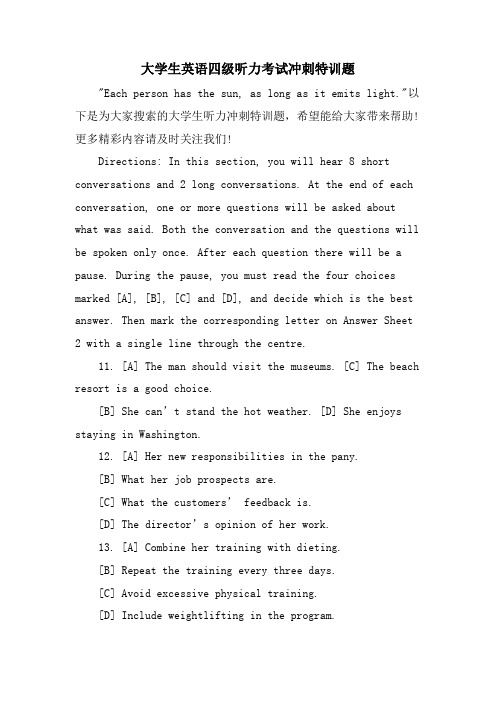
大学生英语四级听力考试冲刺特训题"Each person has the sun, as long as it emits light."以下是为大家搜索的大学生听力冲刺特训题,希望能给大家带来帮助!更多精彩内容请及时关注我们!Directions: In this section, you will hear 8 short conversations and 2 long conversations. At the end of each conversation, one or more questions will be asked about what was said. Both the conversation and the questions will be spoken only once. After each question there will be a pause. During the pause, you must read the four choices marked [A], [B], [C] and [D], and decide which is the best answer. Then mark the corresponding letter on Answer Sheet 2 with a single line through the centre.11. [A] The man should visit the museums. [C] The beach resort is a good choice.[B] She can’t stand the hot weather. [D] She enjoys staying in Washington.12. [A] Her new responsibilities in the pany.[B] What her job prospects are.[C] What the customers’ feedback is.[D] The director’s opinion of her work.13. [A] Combine her training with dieting.[B] Repeat the training every three days.[C] Avoid excessive physical training.[D] Include weightlifting in the program.14. [A] When she will return home.[B] Whether she can go by herself.[C] Whether she can travel by air.[D] When she will pletely recover.15. [A] The woman knows how to deal with the police.[B] The woman had been fined many times before.[C] The woman had violated traffic regulations.[D] The woman is good at finding excuses.16. [A] Switch off the refrigerator for a while.[B] Have someone repair the refrigerator.[C] Ask the man to fix the refrigerator.[D] Buy a refrigerator of better quality.17. [A] He owns a piece of land in the downtown area.[B] He has got enough money to buy a house.[C] He can finally do what he has dreamed of.[D] He is moving into a bigger apartment.18. [A] She is black and blue all over.[B] She has to go to see a doctor.[C] She stayed away from work for a few days.[D] She got hurt in an aident yesterday.Questions 19 to 21 are based on the conversation you have just heard.19. [A] She was a bank manager.[B] She was a victim of the robbery.[C] She was a defence lawyer.[D] She was a witness to the crime.20. [A] A tall man with dark hair and a moustache.[B] A youth with a distinguishing mark on his face.[C] A thirty-year-old guy wearing a light sweater.[D] A medium-sized young man carrying a gun.21. [A] Identify the suspect from pictures. [C] Have her photo taken for their files.[B] Go upstairs to sign some document. [D] Verify the record of what she had said.Questions 22 to 25 are based on the conversation you have just heard.22. [A] By reading a newspaper ad. [C] By listening to the morning news.[B] By seeing a mercial on TV. [D] By calling an employment service.23. [A] She could improve her foreign languages.[B] She could work close to her family.[C] She could travel overseas frequently.[D] She could use her previous experiences.24. [A] Taking management courses. [C] Working as a secretary.[B] Teaching English at a university. [D] Studying fora degree in French.25. [A] Prepare for an interview in a couple of days.[B] Read the advertisement again for more details.[C] Send in a written application as soon as possible.[D] Get to know the candidates on the short list.Directions: In this section, you will hear 3 short passages. At the end of each passage, you will hear some questions. Both the passage and the questions will be spoken only once. After you hear a question, you must choose the best answer from the four choices marked [A], [B], [C] and [D]. Then mark the corresponding letter on Answer Sheet 2 with a single line through the centre.注意:此局部试题请在答题卡2上作答。
大学生英语CET4听力特别训练
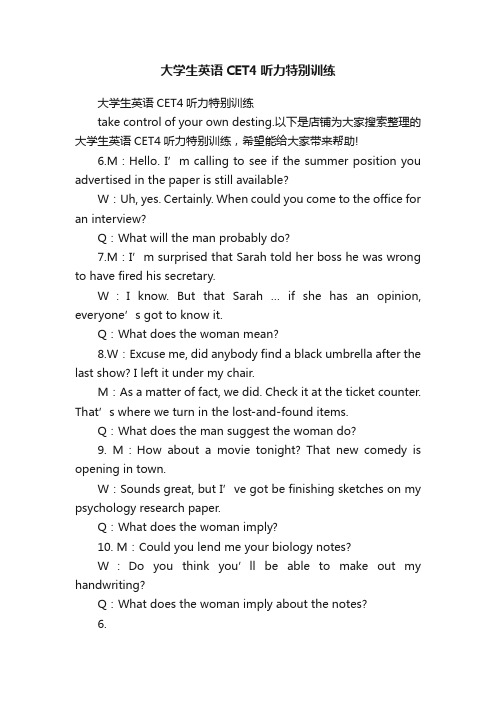
大学生英语CET4听力特别训练大学生英语CET4听力特别训练take control of your own desting.以下是店铺为大家搜索整理的大学生英语CET4听力特别训练,希望能给大家带来帮助!6.M:Hello. I’m calling to see if the summer position you advertised in the paper is still available?W:Uh, yes. Certainly. When could you come to the office for an interview?Q:What will the man probably do?7.M:I’m surprised that Sarah told her boss he was wrong to have fired his secretary.W:I know. But that Sarah … if she has an opinion, everyone’s got to know it.Q:What does the woman mean?8.W:Excuse me, did anybody find a black umbrella after the last show? I left it under my chair.M:As a matter of fact, we did. Check it at the ticket counter. That’s where we turn in the lo st-and-found items.Q:What does the man suggest the woman do?9. M:How about a movie tonight? That new comedy is opening in town.W:Sounds great, but I’ve got be finishing sketches on my psychology research paper.Q:What does the woman imply?10. M:Could you lend me your biology notes?W:Do you think you’ll be able to make out my handwriting?Q:What does the woman imply about the notes?6.A) Order a newspaper.B) Take a trip in the summer.C) Put an advertise in the paper.D) Go to the interviewer’s office.7.A) Sara rarely makes mistakes.B) Sara usually says what she thinks.C) Sara’s boss is hard to work with.D) The secretary wasn’t hard worker.8.A) Look for the umbrella in the theater.B) Ask the ticket seller about the umbrella.C) Buy another ticket for the show.D) Write a check for the umbrella.9.A) She’d prefer to see a different type of movie than a comedy.B) She has already finished her research paper.C) She won’t be able to go to a movie with the man.D) She’d like the man to help h er with her research paper.10.A) She left them at home.B) She needs them right now.C) They might be hard to read.D) They are incomplete.。
最新四级强化训练实用
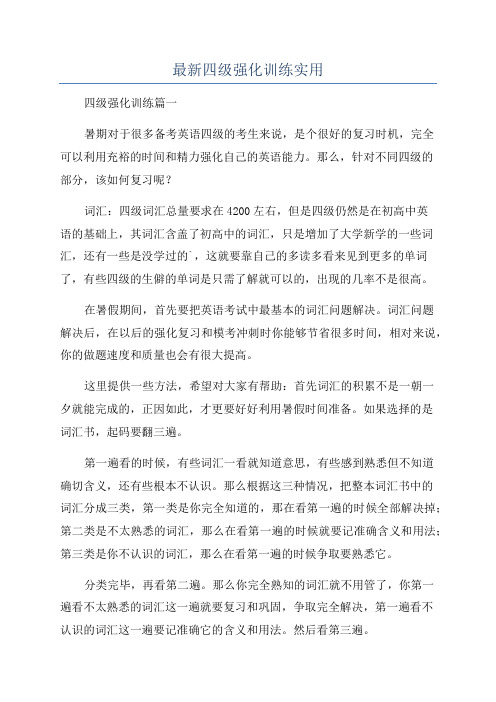
最新四级强化训练实用四级强化训练篇一暑期对于很多备考英语四级的考生来说,是个很好的复习时机,完全可以利用充裕的时间和精力强化自己的英语能力。
那么,针对不同四级的部分,该如何复习呢?词汇:四级词汇总量要求在4200左右,但是四级仍然是在初高中英语的基础上,其词汇含盖了初高中的词汇,只是增加了大学新学的一些词汇,还有一些是没学过的`,这就要靠自己的多读多看来见到更多的单词了,有些四级的生僻的单词是只需了解就可以的,出现的几率不是很高。
在暑假期间,首先要把英语考试中最基本的词汇问题解决。
词汇问题解决后,在以后的强化复习和模考冲刺时你能够节省很多时间,相对来说,你的做题速度和质量也会有很大提高。
这里提供一些方法,希望对大家有帮助:首先词汇的积累不是一朝一夕就能完成的,正因如此,才更要好好利用暑假时间准备。
如果选择的是词汇书,起码要翻三遍。
第一遍看的时候,有些词汇一看就知道意思,有些感到熟悉但不知道确切含义,还有些根本不认识。
那么根据这三种情况,把整本词汇书中的词汇分成三类,第一类是你完全知道的,那在看第一遍的时候全部解决掉;第二类是不太熟悉的词汇,那么在看第一遍的时候就要记准确含义和用法;第三类是你不认识的词汇,那么在看第一遍的时候争取要熟悉它。
分类完毕,再看第二遍。
那么你完全熟知的词汇就不用管了,你第一遍看不太熟悉的词汇这一遍就要复习和巩固,争取完全解决,第一遍看不认识的词汇这一遍要记准确它的含义和用法。
然后看第三遍。
第三遍中前两类词已经不是重点复习对象了,主要复习你第一遍不认识的单词,做到熟悉掌握用法和含义。
三遍下来,相信你的词汇量已经突飞猛进了。
但是千万不要松懈,一定定期复习,并在阅读当中进行检验你的记忆效果。
还有一部分同学喜欢在阅读中记忆单词,有语境,能够清晰准确的记忆。
阅读中出现不认识的词汇时要积极的记下来并查阅其用法,然后进行记忆,一定要记得定时复习。
阅读的材料一定要选好,第一种值得你阅读的就是历年真题,真题中出现的词汇正是常考的词汇。
12月大学英语四级cet4阅读特训
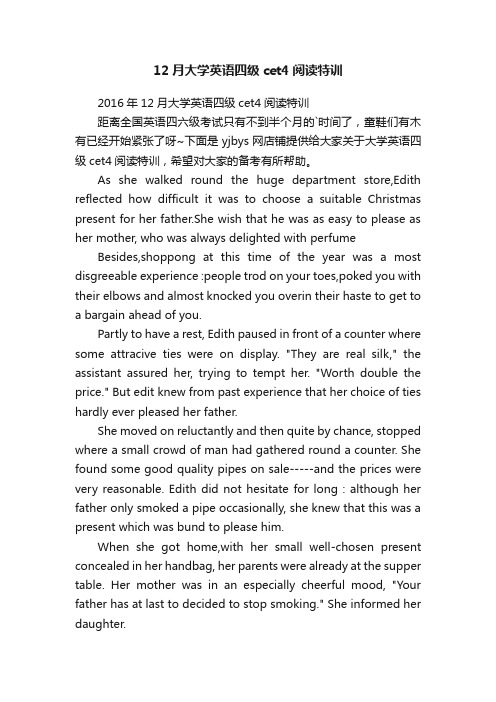
12月大学英语四级cet4阅读特训2016年12月大学英语四级cet4阅读特训距离全国英语四六级考试只有不到半个月的`时间了,童鞋们有木有已经开始紧张了呀~下面是yjbys网店铺提供给大家关于大学英语四级cet4阅读特训,希望对大家的备考有所帮助。
As she walked round the huge department store,Edith reflected how difficult it was to choose a suitable Christmas present for her father.She wish that he was as easy to please as her mother, who was always delighted with perfumeBesides,shoppong at this time of the year was a most disgreeable experience :people trod on your toes,poked you with their elbows and almost knocked you overin their haste to get to a bargain ahead of you.Partly to have a rest, Edith paused in front of a counter where some attracive ties were on display. "They are real silk," the assistant assured her, trying to tempt her. "Worth double the price." But edit knew from past experience that her choice of ties hardly ever pleased her father.She moved on reluctantly and then quite by chance, stopped where a small crowd of man had gathered round a counter. She found some good quality pipes on sale-----and the prices were very reasonable. Edith did not hesitate for long : although her father only smoked a pipe occasionally, she knew that this was a present which was bund to please him.When she got home,with her small well-chosen present concealed in her handbag, her parents were already at the supper table. Her mother was in an especially cheerful mood, "Your father has at last to decided to stop smoking." She informed her daughter.1.Edith's father _______.a.did not like presentb.never got presentc.preferred tiesd.was difficult to choose a present for2.The assistant spoke to Edith because she seemed_______.a.attractiveb.interested in tiesc.tiredd.in need of comfort3.Edith stopped at the next counter_________.a.puroselyb.suddenlyc.unwillinglyd.accidentally4.Edith's father smoked a pipe_______.a.when he was obligedb.on social occasionsc.from time to timed.when he was delighted5.Shopping was very disagreeable at that time of the year because_______.a.coustomers trod on each other's toesb.coustomers poked each other with their elbowsc.customers knocked each otherd.customers were doing their shopping in a great hurry答案:DBDCD。
welearn综合教程二四级综合训练8
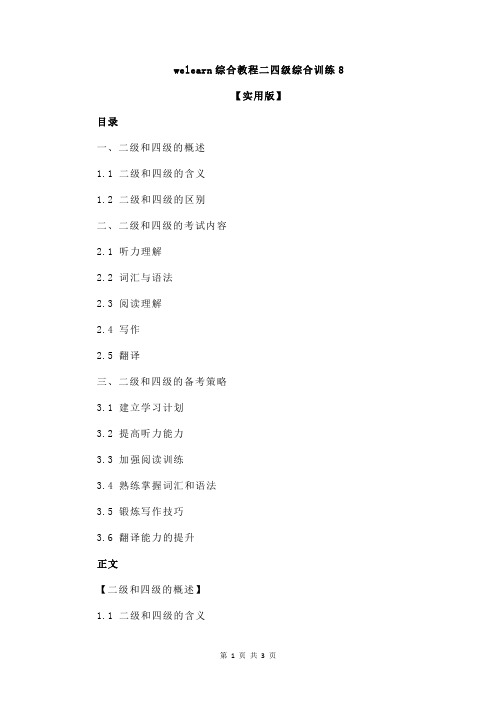
welearn综合教程二四级综合训练8【实用版】目录一、二级和四级的概述1.1 二级和四级的含义1.2 二级和四级的区别二、二级和四级的考试内容2.1 听力理解2.2 词汇与语法2.3 阅读理解2.4 写作2.5 翻译三、二级和四级的备考策略3.1 建立学习计划3.2 提高听力能力3.3 加强阅读训练3.4 熟练掌握词汇和语法3.5 锻炼写作技巧3.6 翻译能力的提升正文【二级和四级的概述】1.1 二级和四级的含义在我国,英语二级和四级考试是评估非英语专业大学生英语水平的重要手段。
其中,英语二级考试主要面向本科生,英语四级考试则主要面向专科生。
通过这两个级别的考试,有助于了解大学生的英语水平,为以后的学习和就业提供参考。
1.2 二级和四级的区别尽管二级和四级考试都是评估大学生英语水平的标准,但它们之间还是存在一定的区别。
首先,在词汇量上,四级考试要求的词汇量要大于二级考试。
其次,在题型上,四级考试的题目难度相对较高,对考生的英语综合运用能力要求也更高。
【二级和四级的考试内容】2.1 听力理解听力理解部分主要测试考生对英语口语的理解能力。
题目类型包括对话、短文及问题等。
2.2 词汇与语法词汇与语法部分主要测试考生对英语词汇和语法规则的掌握程度。
题目类型包括选择题、填空题等。
2.3 阅读理解阅读理解部分主要测试考生对英语文章的理解能力。
题目类型包括阅读短文及问题、阅读长文及问题等。
2.4 写作写作部分主要测试考生的英语书面表达能力。
题目类型包括情景作文、看图作文等。
2.5 翻译翻译部分主要测试考生的英汉互译能力。
题目类型包括英译汉和汉译英等。
【二级和四级的备考策略】3.1 建立学习计划备考二级和四级考试,首先要建立一个合理的学习计划。
计划应包括每天的学习时间、学习内容等,以确保备考期间的学习效果。
3.2 提高听力能力提高听力能力是备考二级和四级的关键。
考生可以通过收听英语广播、观看英语电影等多种途径,提高自己的英语听力水平。
welearn综合教程二四级综合训练8
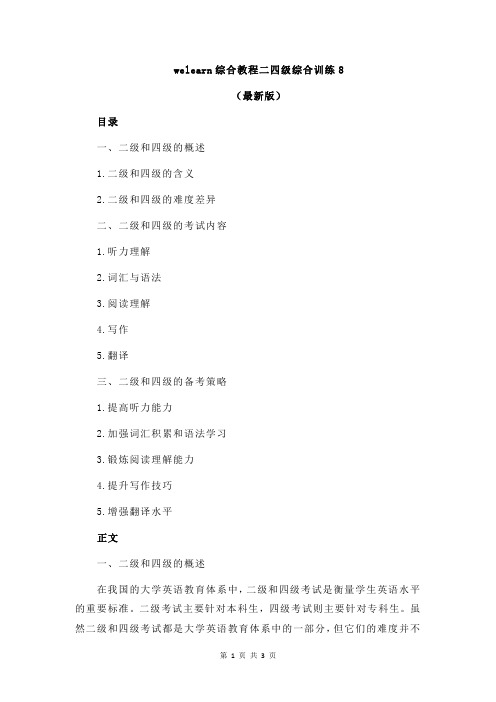
welearn综合教程二四级综合训练8(最新版)目录一、二级和四级的概述1.二级和四级的含义2.二级和四级的难度差异二、二级和四级的考试内容1.听力理解2.词汇与语法3.阅读理解4.写作5.翻译三、二级和四级的备考策略1.提高听力能力2.加强词汇积累和语法学习3.锻炼阅读理解能力4.提升写作技巧5.增强翻译水平正文一、二级和四级的概述在我国的大学英语教育体系中,二级和四级考试是衡量学生英语水平的重要标准。
二级考试主要针对本科生,四级考试则主要针对专科生。
虽然二级和四级考试都是大学英语教育体系中的一部分,但它们的难度并不完全相同。
二级考试相对较易,四级考试则较难。
二、二级和四级的考试内容二级和四级考试的内容主要包括听力理解、词汇与语法、阅读理解、写作和翻译五个部分。
1.听力理解:这是测试学生英语听力能力的部分,包括对话、短文及问题。
2.词汇与语法:这部分测试学生的英语词汇和语法知识,要求学生掌握一定的词汇量和语法规则。
3.阅读理解:阅读理解部分主要是测试学生的阅读和理解能力,包括阅读短文和回答问题。
4.写作:这是测试学生的英语写作能力,要求学生在规定时间内根据题目要求完成一篇文章。
5.翻译:这部分主要测试学生的英汉互译能力,要求学生将英文句子翻译成中文或中文句子翻译成英文。
三、二级和四级的备考策略要想成功通过二级或四级考试,有效的备考策略是必不可少的。
1.提高听力能力:平时要多听英语广播、观看英语电影和电视节目,以提高自己的英语听力水平。
2.加强词汇积累和语法学习:要通过背单词和做语法练习来提高自己的英语词汇和语法知识。
3.锻炼阅读理解能力:要多读英文文章,提高自己的阅读速度和理解能力。
4.提升写作技巧:平时要多进行写作练习,提高自己的写作技巧和表达能力。
5.增强翻译水平:要通过大量的英汉互译练习来提高自己的翻译水平。
总的来说,二级和四级考试是检验大学生英语水平的重要手段。
u校园新视野大学英语4新六级写作特训答案
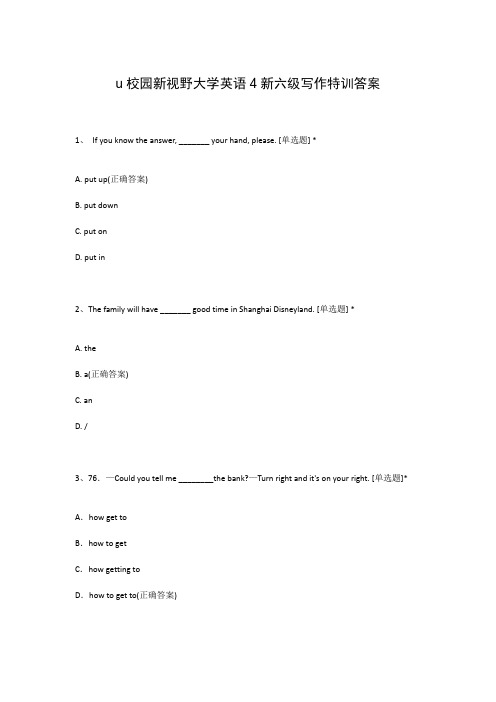
u校园新视野大学英语4新六级写作特训答案1、If you know the answer, _______ your hand, please. [单选题] *A. put up(正确答案)B. put downC. put onD. put in2、The family will have _______ good time in Shanghai Disneyland. [单选题] *A. theB. a(正确答案)C. anD. /3、76.—Could you tell me ________the bank?—Turn right and it's on your right. [单选题]* A.how get toB.how to getC.how getting toD.how to get to(正确答案)4、Mum, this T-shirt is much too small for me. Would you buy me a _______ one? [单选题] *A. niceB. largeC. nicerD. larger(正确答案)5、John will go home as soon as he _______ his work. [单选题] *A. finishB. will finishC. finishedD. finishes(正确答案)6、20.Sometimes it often rains ________ in my hometown in summer. [单选题] * A.heavyB.hardlyC.heavily(正确答案)D.strongly7、Have you kept in()with any of your friends from college? [单选题] *A. contractB. contact(正确答案)C. continentD. touching8、I will _______ at the school gate. [单选题] *A. pick you up(正确答案)B. pick up youC. pick you outD. pick out you9、Can you _______ this form? [单选题] *A. fillB. fill in(正确答案)C. fill toD. fill with10、77.You can watch TV when you finish________ your homework. [单选题] * A.to doB.doC.to doingD.doing(正确答案)11、I'm sorry I cannot see you immediately. But if you wait, I'll see you_____. [单选题] *A. for a momentB. in a moment(正确答案)C. for the momentD. at the moment12、We had a party last month, and it was a lot of fun, so let's have _____ one this month. [单选题] *A.otherB.the otherC.moreD.another(正确答案)13、My dog is very _______. It is safe to touch it if you want to. [单选题] *A. luckyB. deliciousC. friendly(正确答案)D. helpful14、I’m so tired after _______ walk. [单选题] *A. three hour’sB. three hours’(正确答案)C. three hoursD. three hour15、My sister gave me a _______ at my birthday party. [单选题] *A. parentB. peaceC. patientD. present(正确答案)16、Mrs. Green has given us some _______ on how to study English well. [单选题] *A. practiceB. newsC. messagesD. suggestions(正确答案)17、The paper gives a detailed()of how to create human embryos (胚胎)by cloning. [单选题] *A. intentionB. description(正确答案)C. affectionD. effort18、Across the river(). [单选题] *A. lies a new built bridgeB.lies a newly built bridge(正确答案)C. a new built bridge liesD.a newly built bridge lies19、There may be something wrong with her _______. She can’t see things clearly. [单选题] *A. eyes(正确答案)B. earsC. mouthD. nose20、_______ hard, _______ you’ll fail in the exam. [单选题] *A. Studying; forB. Study; or(正确答案)C. To study; andD. Study; and21、You have coughed for several days, Bill. Stop smoking, _______ you’ll get better soon. [单选题] *A. butB. afterC. orD. and(正确答案)22、Mary _______ Math. [单选题] *A. is good at(正确答案)B. do well inC. is good forD. is good with23、35.___________ good music the teacher is playing! [单选题] *A.What(正确答案)B.HowC.What aD.What the24、If you want to _______, you’d better eat more healthy food and do more exercise. [单选题] *A. keep fatB. keep calmC. keep healthy(正确答案)D. keep on25、He gathered his courage and went on writing music. [单选题] *A. 从事B. 靠······谋生C. 继续(正确答案)D. 致力于26、—______is my notebook?—Look! It’s in your schoolbag.()[单选题] *A. WhatB. WhichC. Where(正确答案)D. How27、Having stayed in the United States for more than ten years, he got an American()[单选题] *A. speechB. accent(正确答案)C. voiceD. sound28、If the trousers are too long, ask the clerk to bring you a shorter _____. [单选题] *A. suitB.setC.oneD.pair(正确答案)29、Don’t read in bed. It’s _______ your eyes. [单选题] *A. good atB. good forC. bad atD. bad for(正确答案)30、With all the work on hand, he _____ to the cinema last night. [单选题] *A.should goB.must have goneC.might goD..shouldn’t have gone(正确答案)。
E时代大学英语综合训练4答案大全
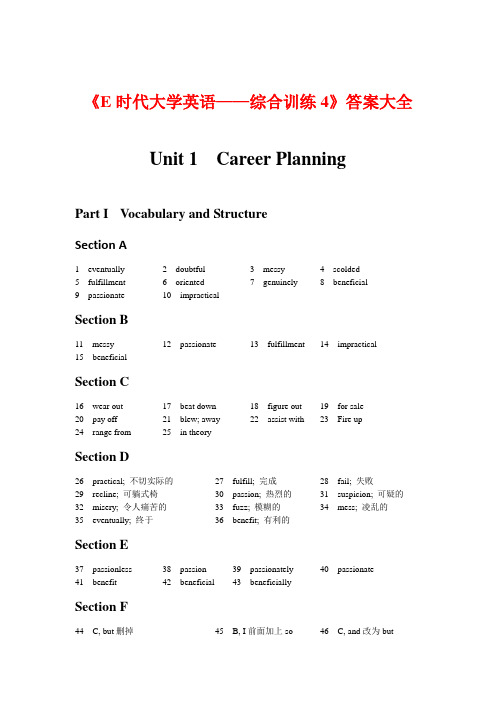
《E时代大学英语——综合训练4》答案大全Unit 1 Career PlanningPart I Vocabulary and StructureSection A1 eventually2 doubtful3 messy4 scolded5 fulfillment6 oriented7 genuinely8 beneficial9 passionate 10 impracticalSection B11 messy 12 passionate 13 fulfillment 14 impractical15 beneficialSection C16 wear out 17 beat down 18 figure out 19 for sale20 pay off 21 blew; away 22 assist with 23 Fire up24 range from 25 in theorySection D26 practical; 不切实际的27 fulfill; 完成28 fail; 失败29 recline; 可躺式椅30 passion; 热烈的31 suspicion; 可疑的32 misery; 令人痛苦的33 fuzz; 模糊的34 mess; 凌乱的35 eventually; 终于36 benefit; 有利的Section E37 passionless 38 passion 39 passionately 40 passionate41 benefit 42 beneficial 43 beneficiallySection F44 C, but删掉45 B, I前面加上so 46 C, and改为but47 B, more改为much 48 D, are改为isSection G49-53 C A B B B 54-58 D D D B APart ⅡReading Comprehension1 E2 L3 D4 O5 A6 F7 I8 B9 G 10 N11—15 D A B A B 16—20 C A B A C21—25 C B A A D26 less 27 walking28 free of charge 29 50 and 30030 McDonald’sPart III TranslationSection A1 turn something I love into a career2 when I was in my thirties3 in my spare time4 at the antique store5 that moment of extreme happiness6 a small business loan7 the right path to success 8 in my career as an author9 focus on the creative part 10 be passionate about your careerSection B11 就他的能力而言,他是干这项工作的最佳人选,但他不够诚实。
《大学英语4级综合能力训练》答案 最新
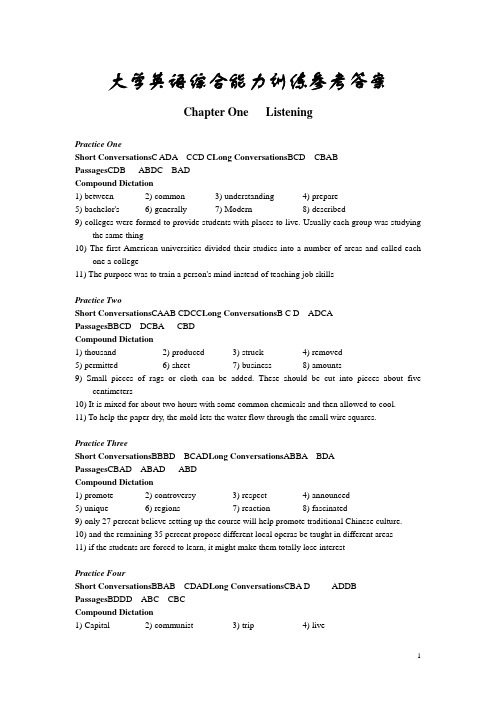
大学英语综合能力训练参考答案Chapter One ListeningPractice OneShort Conversations C ADA CCD C Long Conversations BCD CBABPassages CDB ABDC BADCompound Dictation1) between 2) common 3) understanding 4) prepare5) bachelor's 6) generally 7) Modern 8) described9) colleges were formed to provide students with places to live. Usually each group was studyingthe same thing10) The first American universities divided their studies into a number of areas and called eachone a college11) The purpose was to train a person's mind instead of teaching job skillsPractice TwoShort Conversations CAAB CDCC Long Conversations B C D ADCAPassages BBCD DCBA CBDCompound Dictation1) thousand 2) produced 3) struck 4) removed5) permitted 6) sheet 7) business 8) amounts9) Small pieces of rags or cloth can be added. These should be cut into pieces about fivecentimeters10) It is mixed for about two hours with some common chemicals and then allowed to cool.11) To help the paper dry, the mold lets the water flow through the small wire squares.Practice ThreeShort Conversations BBBD BCAD Long Conversations ABBA BDAPassages CBAD ABAD ABDCompound Dictation1) promote 2) controversy 3) respect 4) announced5) unique 6) regions 7) reaction 8) fascinated9) only 27 percent believe setting up the course will help promote traditional Chinese culture.10) and the remaining 35 percent propose different local operas be taught in different areas11) if the students are forced to learn, it might make them totally lose interestPractice FourShort Conversations BBAB CDAD Long Conversations CBA D ADDBPassages BDDD ABC CBCCompound Dictation1) Capital 2) communist 3) trip 4) live5) government 6) aggressor 7) diplomacy 8) cultural9) praised the event as a chance to improve understanding and trust between North Korea and the United States10) However, the White House spokeswoman said the performance neither hurt nor helpedAmerican diplomatic efforts.11) Those countries have promised aid and improved diplomatic relations if North Korea ends allof its nuclear programs.Practice FiveShort Conversations BACC BDCB Long Conversations CABD BACPassages ADB CDBA CBCCompound Dictation1) mostly 2) paying 3) spread 4) visited5) distribute 6) requested 7) records 8) deaths9) The team reported that limited supplies of bed nets could help explain the more limited effects10) The report says this was in keeping with general improvements in public health services in these countries.11) fell by thirty-four percent in a group of children treated with vitamin A and zinc.Practice SixShort Conversations BCCB DBBA Long Conversations BCD DCBPassages DBC CDB DABCompound Dictation1) popularly 2) legend 3) rescue 4) capable5) instead 6) opponents 7) disappeared 8) immortal9) is gone and other beasts of prey are also scared into forests, people begin to enjoy their peacefullife.10) From then on, the tradition of observing the conquest of Nian is carried on from generation togeneration.11) except they feel the color and the sound add to the excitement of the celebration.Practice SevenShort Conversations CDAB DAAD Long Conversations ABAB BDAPassages BBAB CBC CABDCompound Dictation1) social 2) professor 3) measuring 4) difficult5) campaign 6) crash 7) pressure 8) fans9) But at the same time there are risks. Most people will grow tired of an issue,10) Some people or governments could feel that celebrities are misusing their fame and wealth toinfluence policy.11) But a U.N. spokeswoman said in some cases it was because of procedural reasons.Practice EightShort Conversations CCDB ACBA Long Conversations DAC ADBCompound Dictation1) Estimates 2) happen 3) single 4) division5) produces 6) physically 7) genetic 8) involved9) Or they may be attached at the chest or other part of the body10) This was because the first well-known twins were born in the country now called11) most conjoined twins are found during examinations before they are born. Some are easier toseparate than othersPractice NineShort Conversations CBAC BDCD Long Conversations DCB BDDCPassages DDCC CBCB DAACompound Dictation1) spelling 2) trouble 3) emotionally 4) stupid5) Specialists 6) depression 7) differences 8) compared9) While learning to read, children with dyslexia may not recognize letters or connect them withtheir sounds.10) And they may fail to see or hear similarities and differences in letters and words.11) Schools can provide more time to finish tasks, and more resources to help in taking notes.Practice TenShort Conversations ACBB ACDA Long Conversations CAB DBCPassage s BCA CAB CDABCompound Dictation1) Suppose 2) struggle 3) debated 4) worth5) deal 6) invest 7) attention 8) experience9) Yet critics say that some players who finish college never really learn anything except theirsport.10)Yet finishing college is not always a goal for students who are good enough to playprofessionally11) may not last very long, or lead to the wealth and fame that young players may dream ofPractice ElevenShort Conversations CBBB CADB Long Conversations ABBC DBACPassages DACD DCC BDACompound Dictation1) medium 2) design 3) applied 4) undergraduates5) estimated 6) differs 7) assistance 8) limited9)The university also offers a monthly payment plan to spread out the cost of tuition10) But they may be able to take out private loans, as many American students do11) when it opened in 1853. Later the name was changed to honor the first American presidentPractice TwelveShort Conversations BCBA BACB Long Conversations BCBC ADCCompound Dictation1) Laboratories 2) population 3) deal 4) general5) assistance 6) organizes 7) semester 8) social9) The university also has advisers who explain the rules of student life and try to helpinternational students feel at home.10) they can provide support so the students become involved in school life and make Americanfriends11) an international student office is one of the best places to start getting to know a new countryand its peoplePractice ThirteenShort Conversations DBAC DADA Long Conversations C BD DDBBPassages C BCB C BD CBBDCompound Dictation1) Distance 2) launched 3) earn 4) leadership5) systems 6) officials 7) interactive 8) communicate9) Some classes require students to all log on at the same time so they can attend live lectures by aprofessor10)International students must take two admissions tests before they can be accepted into theprogram11) Educational advisers also say that before you enter any program, make sure the work will berecognized in your countryPractice FourteenShort Conversations BBDC DBAC Long Conversations BDC BC DPassages ACAB ACD CABCompound Dictation1) Enough 2) biggest 3) prevent 4) released5) recent 6) concerned 7) major 8) Bacteria9)The report shows that many Americans do not have their teeth examined by a dentist or trainedexpert10)In addition, a person's earnings seemed to have a major effect on the services received11) American adults and children do not have insurance to help pay for treatment by a dentistPractice FifteenShort Conversations ABCD ABAA Long Conversations CBA ACBPassages DAB BBDB CABBCompound Dictation1) Rising 2) forcing 3) cooler 4) causing5) native 6) events 7) environmental 8) creatures9) Plants and animals have always had to react to changing environments. However, the climate isnow changing faster than ever before10) They used mathematical programs to make sure that only the best information was studied11) some butterflies now live as much as one-hundred kilometers to the north because of changeslinked to higher temperaturesPractice SixteenShort Conversations CBCC ABAC Long Conversations ADB BDACPassages ACC CACD CBDCompound Dictation1) religious 2)including 3) purchased 4) code5) acceptable 6) ban 7)simply 8)restricted9) There are also debates about whether uniforms or other dress policies violate civil rights10) student expression is protected as long as it does not harm the work and discipline of a school.11) They also say uniforms make it easier for security reasons to tell if someone belongs at theschool or not.Practice SeventeenShort Conversations BCDB BBDA Long Conversations BBC BCAPassages BCCD BCBD ABCDCompound Dictation1) highest 2)professional 3) opposed 4) Medical5) meaning 6) survived 7) Requirements 8) organized9) A PhD usually requires at least three years of full-time study after a bachelor's degree.10) Students present their findings by writing a dissertation, a long paper that they have to defendbefore a group of experts.11) Close to one-third of those doctorates went to foreign students in the United States on atemporary visa.Practice EighteenShort Conversations ACCB BDCB Long Conversations DAB BCAPassages ABB ACBA ABDCompound Dictation1)costly 2)Rising 3)concerns 4)less5) two-thirds 6)effect 7) likely 8)areas9) A study done in two thousand two for a major student lender found that debts can also affectlives in other ways10) groups representing students, parents and college officials asked the government to changesome of its loan repayment rules.11) They would be able to pay less right after they graduate, then pay more as their earningsincreaseChapter Two ReadingPractice OneSection APassage One: 1. D 2. B 3. C 4. B 5. APassage Two: 1. D 2. A 3. C 4. D 5. CPassage Three: 1. C 2. A 3. C 4. B 5. DSection B Passage One: 1.Y 2. N 3. N 4. Y 5. Y 6. NG 7. Y8. could do the same thing for someone else 9. giving something back / helping those in need10. for seven families for / to last thirty daysPassage Two: 1.N 2. N 3.Y 4. Y 5. N 6. NG 7. Y8. the honeymoon stage 9. re-entry shock 10. physical and emotionalSection C1.From 1930 to 1934. / Between 1930 and 1934.2.Driving tests and pedestrian crossings. / The introduction of driving tests and pedestriancrossings.3.exceeds the different speed limits in different areas4.Speed limits reduce accidents.5.The increase in traffic density.Practice TwoSection APassage One:1. C 2. D 3. B 4. C 5. A Passage Two: 1. D 2. B 3. A 4. C 5. A Passage Three:1. C 2. B 3. D 4. A 5. B Passage Four: 1. A 2. C 3. B 4. A 5. B Section BPassage One: 1. Y 2. Y 3. N 4. N 5. Y 6. Y 7. NG 8. 45 to 659. both generations / both their children and parents 10. to do again, to go backPassage Two: 1.N 2. Y 3. Y 4.NG 5. Y 6. N 7. N8. Multiple-choice tests 9. demonstrate their skills10. work at their own pace with access to books and materialsSection C1. Whether they were native English speakers2. The same status as their native counterparts.3. Those who are qualified.Those who can teach English effectively.4. The linguistically oppressed are liberated.Unqualified English teachers are singled out.5. qualified non-native teachers of English.Practice ThreeSection APassage One: 1. D 2. B 3. C 4. D 5. A Passage Two:1. A 2. B 3. D 4. C 5.D Passage Three:1. B 2 D 3.C 4. A 5. CSection BPassage One: 1.Y 2. N 3. Y 4 N.G 5. Y 6. N 7. N8. a number of requirements 9. costly / expensive10. rewarding / worth the effort Passage Two: 1. Y 2. N 3. N 4. N 5. Y 6. Y 7. Y 8. plastic shopping bags9. they are stronger and much easier to carry 10. decomposing in three monthsSection C1.appearance, function and the way of being used2.work well and give pleasure3.the curved handle can get too hot to touch4.it is too complicated5.are quicker and cheaperPractice FourSection APassage One:1. B 2. C 3. A 4. C 5. B Passage Two:1. D 2. C 3. A 4. B 5. D Passage Three:1. A 2. B 3. B 4. D 5. C Passage Four:1. A 2. C 3. B 4. A 5. D Section BPassage One: 1. Y 2. N 3. Y 4. N 5. N 6. Y 7. N8. people who persisted, and achieved despite adversity 9. active and strong imagination10. you are very smart, and you are getting smarter every day.Passage Two: 1.Y 2. N 3. Y 4. Y 5.N 6. N 7.Y8. spending time lamenting 9. fine-art painting10.what you do with itSection C1.They want personal freedom.2.Health and safety.3.More care.4.Whether age is happy or unpleasant.5.Doubtful.Practice FiveSection APassage One:1. C 2. B 3. A 4. B 5. D Passage Two:1. A 2. C 3. B 4. A 5. C Passage Three:1. D 2. A 3. A 4. D 5. B Passage Four: 1. D 2. B 3. C 4. B 5. D Section BPassage One: 1. Y 2. N 3. N 4. N 5. Y 6. N 7. N 8. five-year9. the member nations10. the United StatesPassage Two: 1. A 2. D 3. B 4. A 5. C 6. B 7. D8.challenged9.can be proud of10. stay silentSection C1.exposing the food to sun and wind2.When water is removed3.to increase the rate of drying/make them drier4.hot-air(ed) chambers5.they just replace the dried-out moisture with boiling waterPractice SixSection APassage One:1. B 2. C 3. D 4. D 5. CPassage Two: 1. A 2. D 3. C 4. B 5. A Passage Three:1. C 2. A 3. B 4. C 5. DPassage Four: 1. C 2. B 3. D 4. C 5. D Section BPassage One: 1. N 2. Y 3. NG 4. Y 5. N 6. Y 7. N 8. provide money to support research about cancers affecting women 9. helping fight cancer 10. work and familyPassage Two: 1.Y 2. N 3. Y 4. N 5. Y 6. N 7. NG 8. selling medicine imported from Canada 9. fish and hunt 10. the traditional Penobscot way of lifeSection C1.goods, services2.natural resources, its natural resources3.develop its natural resources (peacefully and steadily)4.is abundant in natural resources5.it can be invested for further developmentPractice SevenSection APassage One:1. C 2. A 3. B 4. D 5. BPassage Two: 1. C 2. B 3. A 4. A 5. D Passage Three:1. B 2. B 3. A 4. D 5. BPassage Four: 1. A 2. B 3. C 4. D 5. C Section BPassage One: 1.N 2.Y 3. N G 4. Y 5. Y 6. N 7.N 8. deep concern for others 9. suffer from heart attacks 10. being blackPassage Two: 1.Y 2. N 3. NG 4. N 5. Y 6. N 7. Y 8. stop bleeding 9. is endangered/threatene 10. get some trainingSection C1.hitchhiking2.It is popular in only some parts of the world./Mostly it is doomed.3.It presents a danger./ It is dangerous.4.being rewarded with various prizes5.promoting mutual respect between strangers/protecting the environment /enriching one’sknowledge.Practice EightSection APassage One:1. D 2. B 3. D 4. A 5. CPassage Two: 1. B 2. B 3. B 4. C 5. D Passage Three:1. C 2. B 3. A 4. D 5. BPassage Four: 1. A 2. C 3. A 4. D 5. A Section B1.Y2. Y3. N4. N5. NG6. N7. Y8. the sharks can reproduce9. on the verge of extinction / disappearing 10. a permitSection C1.the brilliance of Brin and L. Page.2.The academic project3.By word of mouth4.meet their price5.advertisingPractice NineSection APassage One: 1. B 2. C 3. B 4. D 5. DPassage Two: 1. B 2. A 3. C 4. D 5. A Passage Three:1. B 2. B 3. C 4. D 5. APassage Four:1. B 2. D 3. C 4. A 5. B Section B1.Y2.Y3. N.4.Y.5. NG6. N7.Y8. unwelcome emails9. names and contact information 10. economic gainSection CPassage One1. sad2.be in the home3.the reasons for students’ sadness4.they are not needed5.to go to collegePassage Two1.rejoining with our ex-lovers; freeing criminals from prisons; returning to old jobs2.the negative ego3.the willingness to forget; the ability to forget4.the desire to live with peace of mind5.repress the anger6.gradual; instantaneousPractice TenSection APassage One:1. A 2. B 3. D 4. B 5. DPassage Two: 1. A 2. D 3. B 4. A 5. B Passage Three:1. D 2. A 3. C 4. B 5. BPassage Two: 1. D 2. C 3. C 4. B 5. A Section B1. N2. N3. Y4. N5. Y6. Y7. NG8. move forward9. looking back 10 the more you get backSection C1.friendly; programmed to behave in a pleasant manner2.suggestions, information, and opinions; topic3.gradual/subtle4.It would make the user irritated.5.After experiencing a lot of powerful, well-timed friendship indicators6.respond to the personality of the userChapter Three Integrated TrainingPractice OneSection APassage One1.D 2.B 3.C 4.A 5.B 6.C 7.D 8.A 9.B 10.C 11.D 12.A 13.B14.C 15.A 16.D 17.A 18.B 19.C 20.APassage Two1.B 2.D 3.A 4.C 5.C 6.C 7.C 8.A 9.B 10.C 11.B 12.D 13.A14.C 15.B 16.C 17.D 18.A 19.A 20.BSection B1. common-----uncommon2. and-----or3. however----hence4. another-----the other5. its----their6. a-----an7. since-----when8. same-----the same9.necessry-----necessarily10. of----in Section CPassage One1. I 2. B 3. D 4. E 5. A 6. J 7. H 8. O 9. G 10. MPassage Two 1. F 2. L 3. A 4. J 5. C 6. O 7. H 8. M 9. I 10. DSection D1. twice as much as/ two times as much as2. distracted me from my reading3. aware of the seriousness of the situation4. As is predicted by some newspaper5. depends on the quality6. only to find that someone had got there before him7. she was not qualified for the job 8.On the behalf of my parents9. took it for granted 10. mistook me for my brother11. was put off / postponed 12. rather than go/ going outPractice TwoSection A 1.a 2.b 3.d 4.c 5.a 6.c 7.d 8.b 9.b 10.a 11.c 12.b 13.d 14.b15.d 16.a 17.c 18.b 19.c 20.dSection BPassage One 1. planting-----planted2. being-----been3. were-----was4. or----nor5. hardly----hard6. smarter----smartest7. so-----but8. saying ----say9. cannot-----can10. so-----as Passage Two1.foods-----food2.when-----after3.had-----has4.less-----more5.to-----/6.are------were7.offer-----offers8.moving----move9.family-----a family10.get----bringSection CPassage One1. C 2. G 3. A 4. 5. O 6. N 7. D 8. J 8. L 9. E 10. IPassage Two1. F 2. J 3. A 4. M 5. N 6. H 7. L 8. G 9. D 10. BSection D1 25% percent higher than that of 2. cost me about fifty yuan3. Please don’t interrupt me4. finding the way to the history museum5. make up for a lack of intelligence6. so much so that he often dreamt about it/ to such an extent that he often dreamt about it7. take people’s sleeping quality into consideration/ consider the quality of human's sleep.8. There is a great contrast 9. whether you like it or not10. consists of / is composed of only two engineersPractice ThreeSection APassage One1.b 2.c 3.d 4.a 5.c 6.a 7.b 8.a 9.b 10.a 11.d 12.a 13.c 14.a15.d 16.d 17.b 18.a 19.b 20.cPassage Two1.b 2.a 3.d 4.b 5.c 6.a 7.d 8.b 9.c 10.a 11.c 12.d 13.a 14.b15.a 16.c 17.b 18.d 19. B 20. ASection B1.amount------number2.except----expect3.it-----/4.that-----what5.able----unable6.to read-----reading7.the----a8.preface----prefaces9.its---it10.example----ruleSection CPassage One 1. E 2. H 3. B 4. O 5. F 6. K 7. N 8.C 9. L 10. IPassage Two 1. F 2. K 3. A 4. L 5. C 6. O 7. D 8. J 9. H 10. MSection D1. keep up the good habit of2. make the best use of their class time3. you may just as well try4. ought to have arrived at 8:005. can one achieve success6. to my taste7. In order to support my university studies (to finance my education)8. He served as the president of the Student Union9. remember to bring with you your textbooks, notebooks, pens and the like10. the field in which we can cooperate 11. he deserves our respect12. Why not call the repairman to check it?Practice FourSection A 1.c 2.b 3.a 4.c 5.d 6.a 7.b 8.c 9.d 10.b 11.c 12.b 13.a 14.d15.a 16.c 17.a 18.d 19.b 20.dSection BPassage One1. to continue---continue2. anything-----nothing3. lead----leads4. less----more5. admiting----admitting6. in----at7. do---doing8. talk-----talking9. about-----from10. Thus----As Passage Two1.which----that2.board----abroadnd----lands4.are --- is5.are ----were6.going ----leaving7.it’s-----its8.office-----offices9.over----under10.where----whenSection CPassage One 1. B 2. O 3. H 4. E 5. J 6. C 7. K 8. N 9. L 10. FPassage Two 1. D 2. B 3. K 4. N 5. C 6. I 7. F 8. O 9. L 10. GSection D1. You should know better than to go swimming2. dissuade him from joining the club/ persuade him not to join the club.3. was held up4. could hardly/not help screaming.5. we hand in our research report(s)6. Don’t be discouraged by their attitude7. at a 40% discount8. is often disposed of under the sea 9. decided/decides to quit / give up the match10. develop its traditional friendshipPractice FiveSection APassage One 1.b 2.d 3.c 4.a 5.b 6.a 7.a 8.c 9.d 10.a 11.a 12.d 13.c 14.b15.a 16.a 17.b 18.c 19.d 20.aPassage Two 1.b 2.b 3.c 4.c 5. d 6.d 7.b 8.a 9.d 10.c 11.a 12.b 13.d 14.d15.c 16.b 17.d 18.c 19.d 20.bSection B1.of去掉2. rises 改raise (提出,引起问题)3. question后加that4. into 改with , clash with 与…冲突5. appeal 后面加to, appeal to 吸引6. reigned 改reigning7. faced 改faces8. term 改terms 条款9. Those 改That , 这里that指上句话的意思,不用复数指代10. Google改为A9, 逻辑上的错误。
最新英语四级考试听力特训题
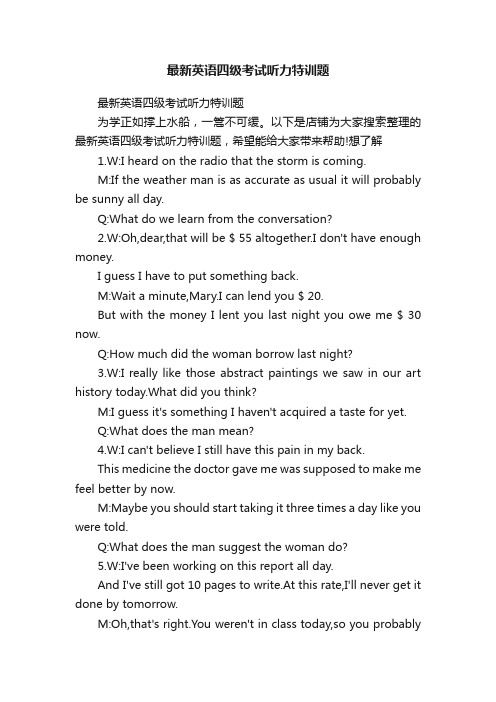
最新英语四级考试听力特训题最新英语四级考试听力特训题为学正如撑上水船,一篙不可缓。
以下是店铺为大家搜索整理的最新英语四级考试听力特训题,希望能给大家带来帮助!想了解1.W:I heard on the radio that the storm is coming.M:If the weather man is as accurate as usual it will probably be sunny all day.Q:What do we learn from the conversation?2.W:Oh,dear,that will be $ 55 altogether.I don't have enough money.I guess I have to put something back.M:Wait a minute,Mary.I can lend you $ 20.But with the money I lent you last night you owe me $ 30 now.Q:How much did the woman borrow last night?3.W:I really like those abstract paintings we saw in our art history today.What did you think?M:I guess it's something I haven't acquired a taste for yet.Q:What does the man mean?4.W:I can't believe I still have this pain in my back.This medicine the doctor gave me was supposed to make me feel better by now.M:Maybe you should start taking it three times a day like you were told.Q:What does the man suggest the woman do?5.W:I've been working on this report all day.And I've still got 10 pages to write.At this rate,I'll never get it done by tomorrow.M:Oh,that's right.You weren't in class today,so you probablyhaven't heard that the deadline has been extended a week.Q:What do we know about the woman?6.M:Can you believe the way Mary was talking to her roommate?No wonder they don't get along.W:Well,maybe Mary was just reacting to something her roommate said.There are two sides to every story,you know.Q:What does the woman mean?7.M:My telephone doesn't seem to be working.And I have lots of calls that I have to return this afternoon.W:Feel free to use mine if you want.I'll be in a meeting till five.Q:What does the woman suggest the man do?8.W:What wrong with you?You sure don't look like yourself.M:Stay away from me.I don't know what I've got.But whatever it is,you don't want to catch it.Q:What can be inferred about the man?9.M:I've noticed that you spend a lot of time tending to your garden.Do you think you might like to join the university gardening club?W:Oh,thanks for the invitation.But this is how I relax.I'd rather not make it something formal.Q:What does the woman mean?10.M:Tom's house is a mess.Doesn't he ever clean it?W:I guess he just has too much else on his mind with that new job of this.Q:What do we know about Tom from the woman's remarks.Passage OneSugar is so much a part of our modern life that we only reallythink about it when,for some reason,we cannot obtain it.It has been known to man for at least 3,000 years,but has come into common use only in modern times.Until quite recently it was considered as a medicine and as a luxury for the very rich only.Sugar is,then,very important to our civilization.But what exactly is it?Of course most of us recognize sugar immediataly as the sweet material which we put in coffee or cakes.This common form of sugar is derived from two plants;the sugar cane and the sugar beet.But there are in fact many types of sugar,and the chemist recognises hundreds of different varieties,each coming from a different source.About 90% of the sugar is produced as food.Only 10% is used in industry for purposes other than food production.Yet sugar has great possibilities for use as the basis of chemicals.It can even be used for making plastics.In the future these potential uses will certainly be developed more than in the past.Questions 11 to 13 are based on the passage you have just heard.11.How long has sugar been used widely?12.What material is mentioned that can be made from sugar?13.Which of the following statements is true?Passage TwoLast week when I was watching TV news,the announcer,whose name was Ralph Story.said something that caught my attention."All great discoveries",he said,"are made by people between the ages of twenty_five and thirty."Being a little over thirty myself I wanted to disagree with him.The next day I spent several hours in the public library looking up ages of famous people and their discoveries.Ralph was right.Galileo discovered by the famous experiment that bodies of different weights fall at the same speed when he was 26.Madame Curie started her research that led to a Nobel Prize when she was 28.Einstein was 26 when he published his world_changing theory of relativity.Well,enough of that.Yet I wondered if those"best years"were true in other fields.Then how about the field of politics?Winston churchill was elected to the House of Commons at the age of 26.Abraham Lincoln gave up the life of a country lawyer and was elected to the government at what age?Twenty_six!But why don't best years come after thirty?After thirty,I guess,most people do not want to take risks or try new ways.Then I thought of people like Shakespeare and Picasso.The former was writing wonderful works at the age of fifty,while the latter was still trying new ways of paining when he was ninety!Perhaps there is still hope for me.Questions 14 to 17 are based on the passage you have just heard.14.What did the speaker do to prove Ralph was wrong?15.How did the speaker feel after his research?16.How did the speaker probably feel in the end?17.What can be concluded from the passage?Passage ThreePeople live with noises all their lives.A place may seem quiet at first,but sound soon come through.During a quiet night at home,you may hear the noise of a refrigerator motor or the heating system.Nature's noises usually bother us less than people's noises.Even in a natural quiet spot one hears birds or animal noises or perhaps the wind.Weather is sometimes very noisy.Noise is everywhere.Noise can travel a long distance.If you live near a free way,you know that mad noise of vehicles can travel from eight to ten miles.Ways in which people can escape unwanted noise include soundproofing,substitution and selective listening.Curtains,for example,can soften noises in a home.Music can cover up less attractive noises by substituting one sound for another.Selective listening can provide escape from noise.When a person does something attentively,the sound seems to disappear.A train that passes on a regular schedule may hardly be noticed after its first noisy journey.It is fortunate that people have ways to reduce the effects of noise although noise will probably not decrease.Questions 18 to 20 are based on the passage you have justheard.18.Which of the following statements is true?19.Which of the following is not a way to escape unwanted noise?20.What is the passage mainly talking about?。
四级综合能力训练答案全
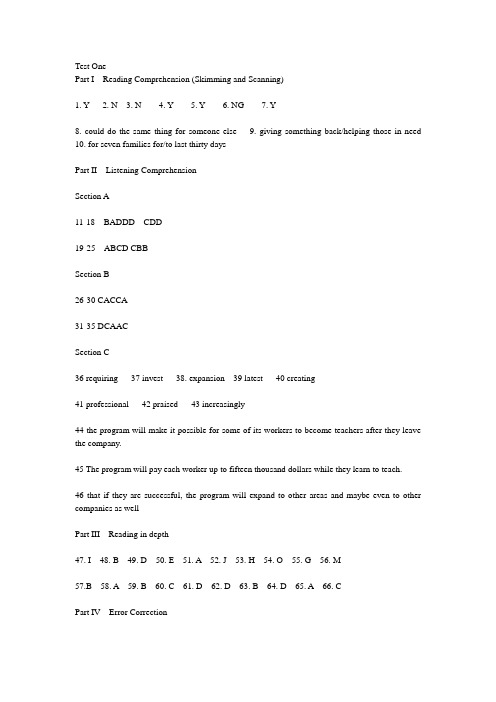
Test OnePart I Reading Comprehension (Skimming and Scanning)1. Y2. N3. N4. Y5. Y6. NG7. Y8. could do the same thing for someone else 9. giving something back/helping those in need 10. for seven families for/to last thirty daysPart II Listening ComprehensionSection A11-18 BADDD CDD19-25 ABCD CBBSection B26-30 CACCA31-35 DCAACSection C36 requiring 37 invest 38. expansion 39 latest 40 creating41 professional 42 praised 43 increasingly44 the program will make it possible for some of its workers to become teachers after they leave the company.45 The program will pay each worker up to fifteen thousand dollars while they learn to teach.46 that if they are successful, the program will expand to other areas and maybe even to other companies as wellPart III Reading in depth47. I 48. B 49. D 50. E 51. A52. J 53. H 54. O 55. G 56. M57.B 58. A59. B 60. C 61. D 62. D 63. B 64. D 65. A66. CPart IV Error Correction67. introducing--- introduced;68. great --- small;69. was---is;70. as 后面的if 去掉;71. was 后面加a;72. with---by;73. been---be;74. it---them;75. requested---required;76. what---thatPart V Translation77. twice as much as/ two times as much as 78. distracted me from my reading 79. aware of the seriousness of the situation 80. As is predicted by some newspaper 81. depends on the qualityPart VI: WritingA Letter Inquiring the Information of the UniversityDear Sir,I am a Chinese citizen who wishes to study at your university. My plan is to start my course next term, and I am writing to see if it is possible for you to provide me with certain essential information.First, what qualifications do I need to follow a course of study at your university? I already have a master's degree from a university here in China, but I wonder if there are any further aca-demic requirements. Second, how much are the tuition fees? Although I intend to be self-support-ing, I would be interested to hear if there are any scholarships available for international students. Third, what is the situation as regards accommodation? I would prefer a single room, which is more conducive to studying, but if single rooms are expensive, I would be willing to share.I am looking forward to your early reply with full application details. Thank you for your attention. (154 words)Y ours sincerely,Li Ming写作指导书信写作属于应用文的范畴,是一种传递信息的方式,也是人际交流的一种工具。
大学英语四级综合特训
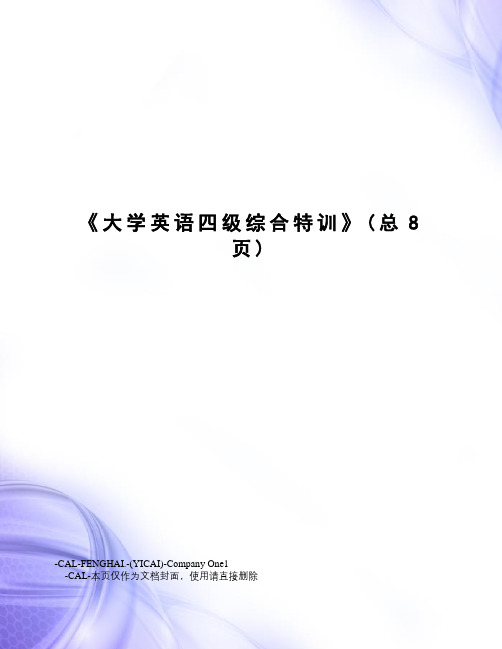
《大学英语四级综合特训》(总8页)-CAL-FENGHAI.-(YICAI)-Company One1-CAL-本页仅作为文档封面,使用请直接删除******************《《大学英语四级综合特训》》******************------------《大学英语四级综合特训》内容简介------------本书紧扣四级改革要求,全面深入地解析了完形填空、短句问答、改错和汉译英四种题型,并由点及面地归纳考点,传授解题技巧。
------------《大学英语四级综合特训》前言------------前言:大学英语四、六级考试改革的帷幕已经拉开,计分体制改为了710分标准分制,与此同时,考试新样题也已正式公布。
为帮助考生全面了解改革后的四、六级考试,新东方四六级命题研究组特根据“全新考试样卷”编写了“决战新题型系列”丛书。
本丛书紧扣四、六级考试改革要求,深入剖析四、六级考试新题型,是集指导、练习于一体的特训练习册。
本丛书之一的《大学英语四级综合特训》紧扣四级改革要求,全面深入地解析了完形填空、短句问答、改错和汉译英四种题型。
本书特点如下:透析新题型,传授真技巧本书全面而系统地剖析了四级综合测试部分的四种题型,于细微处着眼,层层分析,一一击破,为考生更快、更好地突破四级综合测试部分提供制胜之道。
本书“第一章考试概要”全面介绍了四种题型的设置及评分标准,并为考生介绍了根据不同的题型量身定做的实用的应试技巧。
在介绍了解题步骤和应试技巧等理论知识后,密切结合实际,通过对历年四级真题的详尽解析向考生具体介绍各个步骤和技巧的操作方法。
由点及面,归纳考点本书严格按照考试大纲和试点考试样卷编写,精心挑选了大部分习题,供考生在“第二章专项训练”中对各题型一一突破,并在“第三章模拟考场”中进行考前热身训练。
书中所收录的大部分习题在解析之后附有相关的考点归纳,总结以往考试中出现过的相关相似词组、相近句型、经典语法等,如随堂老师般授业解惑,拓展考生解题思路,培养考生举一反三的学习技能。
大学四级考试辅导2024新版

指出学生在翻译过程中可能犯的错误,并 提供改进建议。
05
写作部分辅导
写作题型分析与技巧
题型概述
四级写作主要考察学生的英语 书面表达能力,通常包括议论
文、应用文等类型。
审题准确
仔细分析题目要求,明确写作 主题和观点。
结构清晰
合理安排文章结构,包括开头 、正文和结尾。
语言规范
使用正确的语法、词汇和句型 ,表达流畅、准确。
常用短语和句型总结
固定搭配
总结常见的动词短语、介词短语等固定搭配,如“take into account”、“in terms of”等,以便在写作和翻译 中准确运用。
句型结构
梳理英语中常见的句型结构,如并列句、复合句、强调句 等,并分析其特点和使用场景,提高句子的表达能力。
写作模板
针对不同类型的写作任务,总结相应的写作模板和常用表 达,如议论文的开头、结尾模板,图表作文的常用描述词 汇等。
定语从句和名词性从句
回顾定语从句和名词性从句的引导词、语序等知 识点,并分析其在句子中的功能和作用。
07
模拟考试与真题解析
模拟考试流程介绍
报名及考试时间
01
通常提前一个月进行在线报名,考试时间在每年的6月和12月。
考试形式
02
采用计算机化考试形式,包括听力、阅读、写作和翻译四个部
分。
考试内容
03
注意语言表达的准确性和流畅性;
技巧点拨 理解原文意思,把握语言背景;
中英文表达差异及转换方法
语言结构差异
中文重意合,英文重形合;
思维方式差异
中文重悟性,英文重理性;
中英文表达差异及转换方法
• 表达习惯差异:中文多主动,英文多被动。
英语四级考试听力理解专项训练
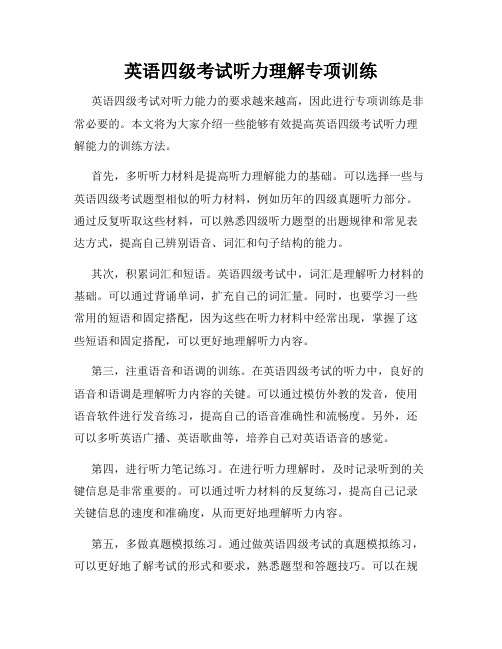
英语四级考试听力理解专项训练英语四级考试对听力能力的要求越来越高,因此进行专项训练是非常必要的。
本文将为大家介绍一些能够有效提高英语四级考试听力理解能力的训练方法。
首先,多听听力材料是提高听力理解能力的基础。
可以选择一些与英语四级考试题型相似的听力材料,例如历年的四级真题听力部分。
通过反复听取这些材料,可以熟悉四级听力题型的出题规律和常见表达方式,提高自己辨别语音、词汇和句子结构的能力。
其次,积累词汇和短语。
英语四级考试中,词汇是理解听力材料的基础。
可以通过背诵单词,扩充自己的词汇量。
同时,也要学习一些常用的短语和固定搭配,因为这些在听力材料中经常出现,掌握了这些短语和固定搭配,可以更好地理解听力内容。
第三,注重语音和语调的训练。
在英语四级考试的听力中,良好的语音和语调是理解听力内容的关键。
可以通过模仿外教的发音,使用语音软件进行发音练习,提高自己的语音准确性和流畅度。
另外,还可以多听英语广播、英语歌曲等,培养自己对英语语音的感觉。
第四,进行听力笔记练习。
在进行听力理解时,及时记录听到的关键信息是非常重要的。
可以通过听力材料的反复练习,提高自己记录关键信息的速度和准确度,从而更好地理解听力内容。
第五,多做真题模拟练习。
通过做英语四级考试的真题模拟练习,可以更好地了解考试的形式和要求,熟悉题型和答题技巧。
可以在规定的时间内完成模拟考试,检验自己的听力能力,并查漏补缺,提高错误率。
综上所述,通过多听听力材料,积累词汇和短语,注重语音和语调的训练,进行听力笔记练习,以及多做真题模拟练习等方法,可以有效提高英语四级考试听力理解能力。
希望广大考生都能够在英语四级考试中取得好成绩。
- 1、下载文档前请自行甄别文档内容的完整性,平台不提供额外的编辑、内容补充、找答案等附加服务。
- 2、"仅部分预览"的文档,不可在线预览部分如存在完整性等问题,可反馈申请退款(可完整预览的文档不适用该条件!)。
- 3、如文档侵犯您的权益,请联系客服反馈,我们会尽快为您处理(人工客服工作时间:9:00-18:30)。
大学英语四级综合特训------------《大学英语四级综合特训》内容简介------------本书紧扣四级改革要求,全面深入地解析了完形填空、短句问答、改错和汉译英四种题型,并由点及面地归纳考点,传授解题技巧。
------------《大学英语四级综合特训》前言------------前言:大学英语四、六级考试改革的帷幕已经拉开,计分体制改为了710分标准分制,与此同时,考试新样题也已正式公布。
为帮助考生全面了解改革后的四、六级考试,新东方四六级命题研究组特根据“全新考试样卷”编写了“决战新题型系列”丛书。
本丛书紧扣四、六级考试改革要求,深入剖析四、六级考试新题型,是集指导、练习于一体的特训练习册。
本丛书之一的《大学英语四级综合特训》紧扣四级改革要求,全面深入地解析了完形填空、短句问答、改错和汉译英四种题型。
本书特点如下:透析新题型,传授真技巧本书全面而系统地剖析了四级综合测试部分的四种题型,于细微处着眼,层层分析,一一击破,为考生更快、更好地突破四级综合测试部分提供制胜之道。
本书“第一章考试概要”全面介绍了四种题型的设置及评分标准,并为考生介绍了根据不同的题型量身定做的实用的应试技巧。
在介绍了解题步骤和应试技巧等理论知识后,密切结合实际,通过对历年四级真题的详尽解析向考生具体介绍各个步骤和技巧的操作方法。
由点及面,归纳考点本书严格按照考试大纲和试点考试样卷编写,精心挑选了大部分习题,供考生在“第二章专项训练”中对各题型一一突破,并在“第三章模拟考场”中进行考前热身训练。
书中所收录的大部分习题在解析之后附有相关的考点归纳,总结以往考试中出现过的相关相似词组、相近句型、经典语法等,如随堂老师般授业解惑,拓展考生解题思路,培养考生举一反三的学习技能。
本书得以顺利完成,要特别感谢世纪友好工作室的金莉、周利芬、陈欢、宋李戈、何静老师。
他们对英语教学和研究的热爱与投入才使得本书能在第一时间与考生见面。
相信考生在深入了解新题型且掌握重要考点及有效的技巧后,定能从容应对新四级考试的综合测试。
最后祝所有备战新四级的考生征途顺利,马到成功!新东方四六级命题研究组2006年3月------------《大学英语四级综合特训》目录------------您下载的该文件来自TXT下载欢迎访问:目录:第一章考试概要第一节概况1第二节完形填空3第三节短文改错8第四节简答14第五节汉译英18第二章专项训练第一节完形填空22 第二节短文改错88 第三节简答108第四节汉译英128 第三章模拟考场Unit 1 138Unit 2 143Unit 3 147Unit 4 153Unit 5 158Unit 6 164Unit 7 168Unit 8 173Unit 9 178Unit 10 184Unit 11 187Unit 12 192Unit 13 197Unit 14 203Unit 15 207Unit 16 211Unit 17 216Unit 18 220Unit 19 224Unit 20 228附录惯用搭配232大学英语四级考试试点考试样卷250------------第一节、概况------------第一节概况一、大纲要求2004年初教育部高教司组织制定并在全国部分高校开始试点执行《大学英语课程教学要求(试行)》,其中规定,大学英语课程的教学目标是:培养考生的英语综合应用能力,特别是听说能力,使他们在今后的工作和社会交往中能用英语有效地进行口头和书面的信息交流。
针对这种现象,经过多年的实践探索,教育部开始着手现行英语四、六级考试的改革。
其中重要的举措之一就是摒弃了原四级考试第三部分对词汇的考查,加大了对英语综合应用能力的考查。
大学英语四、六级考试改革项目组和考试委员会先后在2005年2月和10月公布了两张略有差异的题型分布表:从表1可以看出,新题型的综合测试分为两个部分,第一部分为完形填空或改错,第二部分为篇章回答或中译英。
在表2中“篇章问答”改名为“短句问答”,且成为“篇章词汇理解”的替换题型,而非表1中翻译的替换题型。
综观上述两表可知,翻译为必考题型。
在完形填空、短句回答、改错和翻译(中译英)这四种题型中,前两种为原有题型,后两种为新增题型。
为便于讲解,我们统称这四种题型为综合测试部分。
本书按照新大纲试行方案要求,针对改革后对四级考试综合测试部分的调整,根据中国现行英语教学、考试特点编写而成。
在接下来的几节中我们将对综合测试部分的各种题型逐一进行剖析。
二、改革进程自2006年6月开始,改革后的四级考试将在参加大学英语教学改革试点的180所院校试行。
改革后的四级考试将于2007年1月在全国范围内展开。
三、评分标准自2005年6月的考试起,四级考试成绩采用了满分为710分的记分体制,不设及格线,成绩报道的方式由考试合格证书改为成绩报告单,即考后向总分在220分以上(含220分)的考生发放成绩报告单。
凡总分在220分以下者(包括缺考者和作弊违纪者),其单项分和总分均计为0分,不发成绩报告单。
成绩报告单的报道内容包括总分和单项分。
试点阶段四级考试单项分的报道共分为四个部分:听力(35%)、阅读(35%)、完形填空或改错(10%)、作文和翻译(20%)。
各单项报道分的满分分别为:听力249分,阅读249分,完形填空或改错70分,作文142分。
各单项分相加之和等于总分(710分)。
------------第二节、完形填空------------第二节完形填空一、题型介绍完形填空的目的是测试考生运用语言的综合能力,即理解篇章和使用词汇、语法的能力。
该部分测试的基本形式是:在一篇题材熟悉、难度适中的短文(200~250词)内留有20个空白,每个空白为一题,每题四个选项,要求考生在全面理解内容的基础上选择一个最佳答案,使短文的意思和结构恢复完整。
一般来说,做题时间为15分钟,分值为10分。
通过分析历年真题,我们将完形填空的命题规律总结如下:1. 文章体裁和题材。
文章体裁以议论文和说明文为主,极少出现记叙文。
文章题材涉及教育、科技、人文等,其中与考生密切相关的教育是选材的重点。
2. 考查对象。
历年完形填空中有70%的题考查实义词(也称实词,包括名词、动词、形容词、副词等),而另外30%的题考查结构词(也称虚词,包括介词、连词、冠词、关系词等)。
在近两年的完形填空题中,考查实义词和结构词题目的比例基本保持在14:6。
3. 题型。
完形填空有四种题型:词义辨析题、惯用搭配题、语法题和逻辑衔接题。
从考题统计分析来看,词义辨析题和逻辑衔接题是考查的重点,尤其是近三年来,逻辑衔接题的比重在不断加大。
二、解题技巧(一)解题步骤从表面来看,完形填空的测试点及解题方法就是恢复空白处的词。
而事实上,四级考试的完形填空综合了词汇、结构以及阅读理解部分的测试内容。
它不仅测试考生在词汇和句子上运用语言的能力,还考查考生在语篇结构上综合运用语言结构的能力。
完形填空中所填的词与文章的上下文是紧密相连的。
根据完形填空这一测试特点,答题时应采取以下五个步骤:步骤一,通读全文通读全文的目的是要弄清文章的大意和结构,确立正确的背景知识,为正式的做题做好充分的准备。
很多考生认为阅读一篇满是空格的文章毫无意义,与其这样浪费时间,倒不如看一句,填一空。
其实,这就陷入了一个误区。
要知道,短文中的空格不是随便去掉的,从考查考生语言综合能力这一目的而言,完形填空在出题时有这样一条原则:去掉20个词后不会影响考生对文章大意的了解。
所以,考生在正式做题前,千万不能省掉通读全文这一步。
此外,考生在第一遍阅读中,要善于从文章开头的几句话把握短文的背景、主题和结构,并结合常识对文章大意构建一定的轮廓,并在随后的阅读中,不断修正,以求与原文一致。
通常情况下,文章开头的一、二句话都包含完整的信息,这些句子揭示文章的背景知识或主题思想,考生一定要仔细研读,为后面的阅读扫清障碍。
步骤二,初选答案读完文章,了解大意后,考生便可以开始做题了。
做题时,最好按顺序来做,千万不要从后往前做。
为避免浪费时间,可以先跳过没有把握的题目,接着往下做;有些题目可以从下文中找到暗示信息,因此对不确定的题目最好不要过多纠缠。
做题时还需注意空格前后的介词可能会与空格处所缺的词语构成固定搭配;文章中表转折、条件、让步等的连词、副词也可能为解答提供线索。
步骤三,查漏补缺对于实在解答不出的“难”题,可以凭借自己的语感来猜测答案,一定要相信自己的“第一印象”,相信自己的第一感觉。
有一些题也可结合常识来解答。
步骤四,验证答案做完题目后,考生应利用一到两分钟时间将答案带入原文通读,通读的目的是通过“语感”来验证答案。
这样读下来,不但可以改正填错的词,而且还可以在这一过程中得到启发,把做不出来的题目填出来。
(二)直击考点明确解题步骤后,我们将通过完形填空的四种题目设置来介绍具体的解题技巧。
1. 词义辨析题。
词义辨析题主要是对实义词的辨析。
此类题的四个选项或词形相似,如begin和benign;或词义相近,如speak和talk,需要考生具备一定的阅读辨识能力,能够结合上下文提供的信息,分辨选项之间的细微差异,做出正确的判断。
例1:Nevertheless, as the following suggestions and comments indicate, students feel 80 with things as they are in the classroom. Professors should be discouraged from reading lecture notes. “It makes their voices monotonous (单调的)”...(CET-4, 2001. 1)80. [A]dissatisfied [B]unsatisfactory [C]satisfied [D]satisfactory解析:选A,词义辨析题。
首先在文章中找线索:as the following suggestions and comments indicate,其中信号词following(接下来的)提示可以在后文中找答案。
后文中给出的monotonous意为“单调的”,由此可知,考生觉得课堂枯燥乏味,也就是说考生对课堂教学不满意,因此feel后面的空格应填“不满意”,选A。
另外,选项B 和D只能修饰事物,可以首先排除。
可见,一些重要的信号词或短语(如:following, as mentioned above, and, but等)是帮助考生在上下文中寻找线索的“有力武器”。
a. 通过判断句中的语义逻辑关系确定答案。
主要通过连接词判断逻辑关系,这些连接词对理解全句的结构和意义有很大的帮助,如:表并列关系的连接词(and和or等)的前后应为语法和意义相同的词;表转折关系的连接词(but和however等)前后应为反义或意思相对的词;b. 通过常识或结合生活中的习惯思维或说法来确定答案。
